| Comment report |
|
| Lists all the questions in the survey and displays all the comments made to these questions, if applicable. |
| Table of contents |
|
Report info
|
|
Question 1:
Do you conduct research in, teach, or study machine learning?
|
|
Question 2:
What do you do?
|
|
Question 3:
Which department(s) are you based in? (You may select more than one)
|
|
Question 4:
Which conferences do you regularly attend? (You may pick more than one)
|
|
Question 5:
Do you have (or have you had) students in machine learning?
|
|
Question 6:
What is your educational background/training/disciplinary background? (You may select more th...
|
|
Question 7:
Did your educational background prepare you well for research in machine learning?
|
|
Question 8:
What educational backgrounds do your students have? (You may select more than one)
|
|
Question 9:
Did the educational backgrounds of your students prepare them well for studying machine learni...
|
|
Question 10:
In your opinion, what will constitute good educational backgrounds for a graduate student ente...
|
|
Question 11:
What area(s) in machine learning do you work in? (You may select more than one)
|
|
Question 12:
What other area(s) do you work in? (You may select more than one)
|
|
Question 13:
In your opinion, what are core (foundation) areas of machine learning? (You may select as man...
|
|
Question 14:
In your opinion, machine learning is a subfield of statistics.
|
|
Question 15:
In your opinion, machine learning is a subfield of computer science.
|
|
Question 16:
In your opinion, machine learning is a subfield of cognitive science.
|
|
Question 17:
In your opinion, machine learning is a subfield of neuroscience.
|
|
Question 18:
In your opinion, machine learning is a subfield of engineering.
|
|
Question 19:
In your opinion, machine learning is a subfield of artificial intelligence.
|
|
Question 20:
In your opinion, machine learning is an interdisciplinary area.
|
|
Question 21:
In your opinion, machine learning is a a discipline distinct from other disciplines.
|
|
Question 22:
Any further comments regarding the relationship of machine learning to other disciplines?
|
|
Question 23:
In your opinion, in the university, machine learning should ideally be a group within computer...
|
|
Question 24:
In your opinion, in the university, machine learning should ideally be a group within neurosci...
|
|
Question 25:
In your opinion, in the university, machine learning should ideally be a group within engineer...
|
|
Question 26:
In your opinion, in the university, machine learning should ideally be a group within statisti...
|
|
Question 27:
In your opinion, in the university, machine learning should ideally be a group within psycholo...
|
|
Question 28:
In your opinion, in the university, machine learning should ideally be a spread across multipl...
|
|
Question 29:
In your opinion, in the university, machine learning should ideally be an interdisciplinary ce...
|
|
Question 30:
In your opinion, in the university, machine learning should ideally be its own department.
|
|
Question 31:
In your opinion, in the university, machine learning should be taught at the graduate level.
|
|
Question 32:
In your opinion, in the university, machine learning should be taught as a specialist track in...
|
|
Question 33:
In your opinion, in the university, machine learning should be taught in a dedicated undergrad...
|
|
Question 34:
In your opinion, in which departments should machine learning be taught?
|
|
Question 35:
Any further comments regarding the place of machine learning within the university?
|
|
Question 36:
What brought you into machine learning? (You may select more than one)
|
|
Question 37:
In your opinion, what are the goals of machine learning? (You may select more than one)
|
|
Question 38:
Do you have further comments regarding any part of this survey?
|
| Report info |
|
| Report date |
Tuesday, March 29, 2011 12:25:10 PM BST |
|
| Start date |
Monday, April 4, 2011 12:47:00 AM BST |
|
| Stop date |
Sunday, April 24, 2011 11:59:00 PM BST |
|
| Stored responses |
784 |
|
| Number of completed responses |
527 |
| Question 1 |
|
| Do you conduct research in, teach, or study machine learning? |
| Frequency table |
|
Choices
|
Absolute frequency |
Relative frequency |
Adjusted relative frequency |
|
Yes
|
749 |
95.54% |
95.54% |
|
No
|
35 |
4.46% |
4.46% |
| Sum: |
784 |
100% |
100% |
| Total answered: 784 |
| Plot |
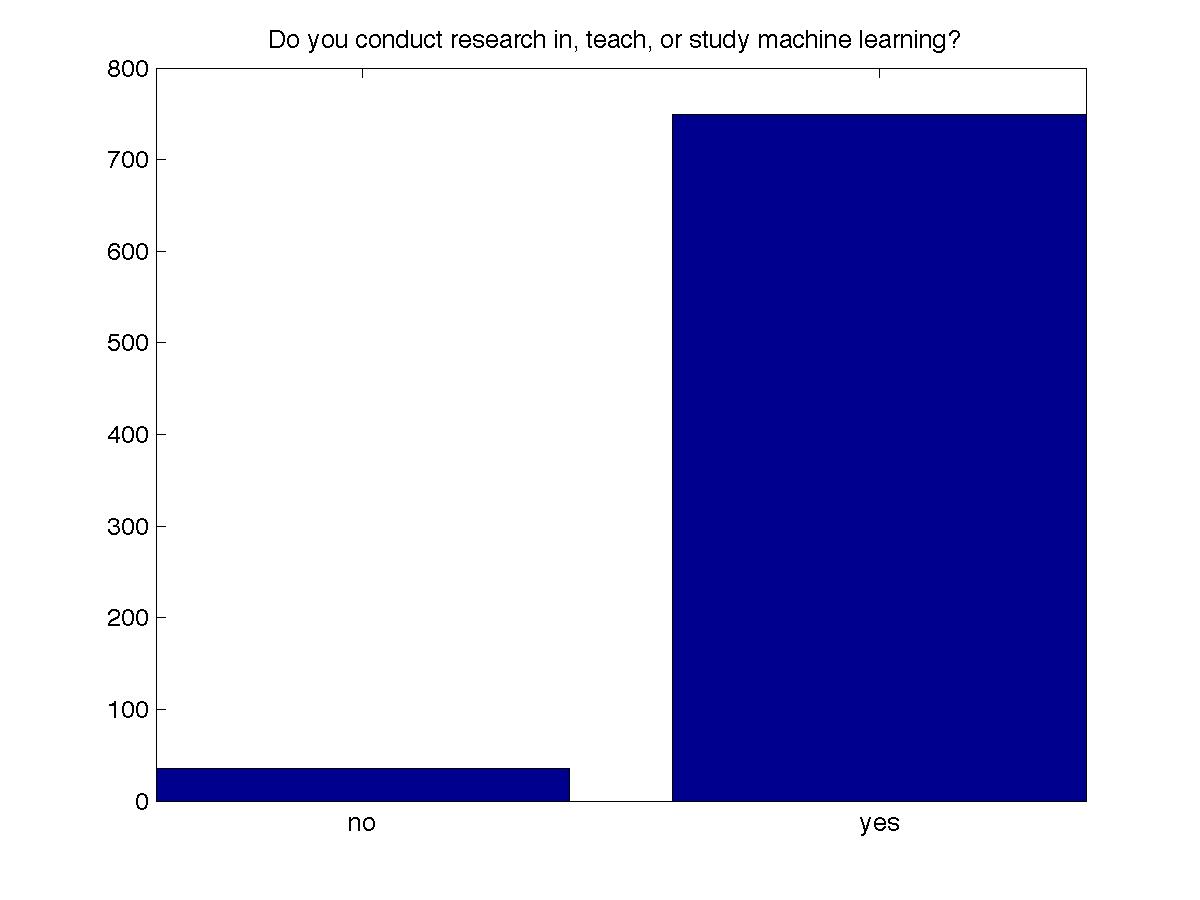 |
|
| Question 2 |
|
| What do you do? |
| Frequency table |
|
Choices
|
Absolute frequency |
Relative frequency |
Adjusted relative frequency |
|
Graduate student
|
248 |
31.63% |
38.57% |
|
Research associate or postdoctoral fellow at an academic institution
|
127 |
16.2% |
19.75% |
|
Researcher in an industrial laboratory
|
56 |
7.14% |
8.71% |
|
Faculty at an academic institution
|
188 |
23.98% |
29.24% |
|
Other:
|
24 |
3.06% |
3.73% |
| Sum: |
643 |
100% |
100% |
| Total answered: 643 |
|
| Question 3 |
|
| Which department(s) are you based in? (You may select more than one) |
| Frequency table |
|
Choices
|
Absolute frequency |
Relative frequency |
Adjusted relative frequency |
|
Biology
|
16 |
1.68% |
2.49% |
|
Cognitive science
|
21 |
2.2% |
3.27% |
|
Computer science
|
459 |
48.11% |
71.5% |
|
Economics
|
2 |
0.21% |
0.31% |
|
Electrical engineering
|
63 |
6.6% |
9.81% |
|
Engineering sciences
|
48 |
5.03% |
7.48% |
|
Machine Learning
|
162 |
16.98% |
25.23% |
|
Mathematics
|
34 |
3.56% |
5.3% |
|
Neuroscience
|
39 |
4.09% |
6.07% |
|
Operations research
|
7 |
0.73% |
1.09% |
|
Physics
|
6 |
0.63% |
0.93% |
|
Psychology
|
4 |
0.42% |
0.62% |
|
Social science
|
2 |
0.21% |
0.31% |
|
Statistics
|
56 |
5.87% |
8.72% |
|
Other:
|
35 |
3.67% |
5.45% |
| Sum: |
954 |
100% |
100% |
| Total answered: 642 |
| Plot |
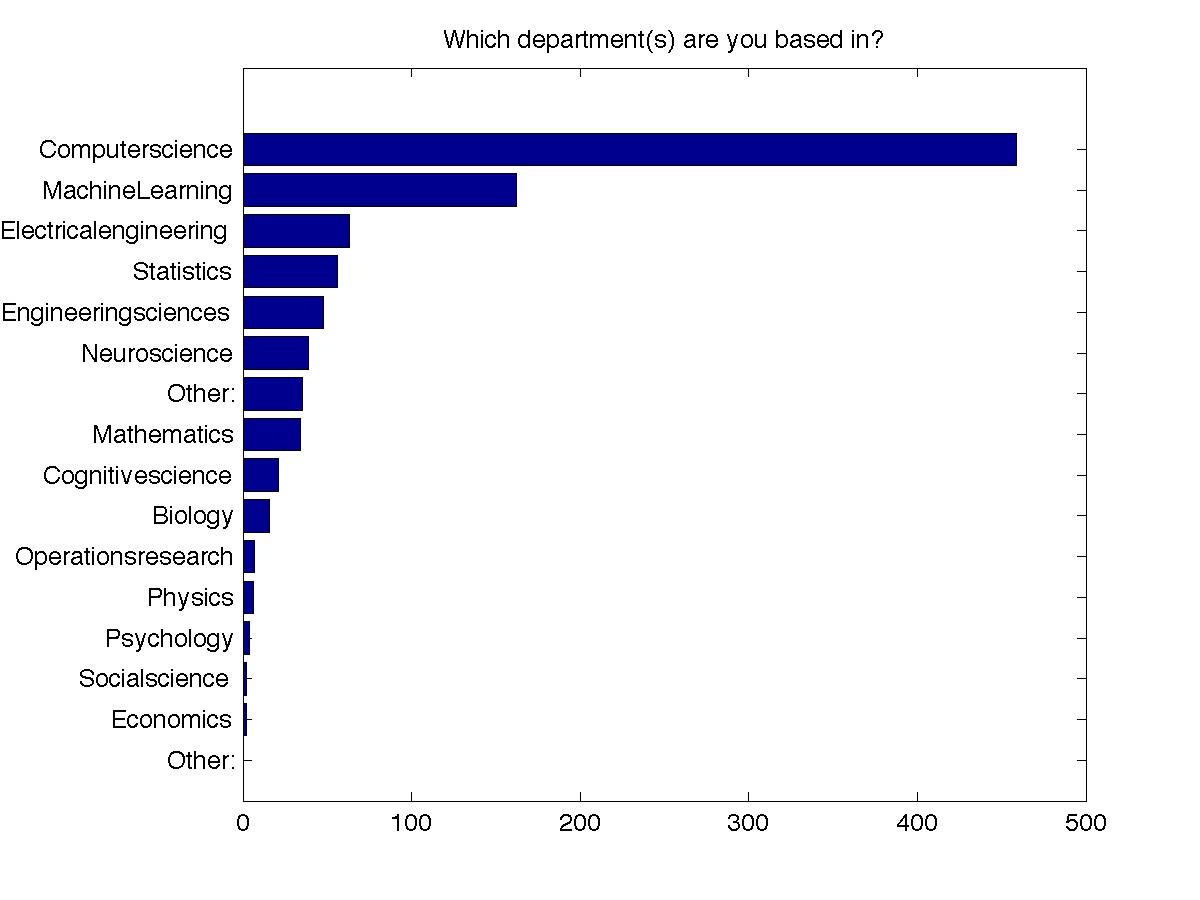 |
|
| Question 4 |
|
| Which conferences do you regularly attend? (You may pick more than one) |
| Frequency table |
|
Choices
|
Absolute frequency |
Relative frequency |
Adjusted relative frequency |
|
AAAI
|
80 |
5.86% |
17.06% |
|
ACL
|
56 |
4.1% |
11.94% |
|
AISTATS
|
87 |
6.37% |
18.55% |
|
ALT
|
12 |
0.88% |
2.56% |
|
CogSci
|
13 |
0.95% |
2.77% |
|
COLT
|
43 |
3.15% |
9.17% |
|
CoNLL
|
25 |
1.83% |
5.33% |
|
Cosyne
|
15 |
1.1% |
3.2% |
|
CVPR
|
47 |
3.44% |
10.02% |
|
ECCV
|
20 |
1.46% |
4.26% |
|
ECML
|
108 |
7.91% |
23.03% |
|
EMNLP
|
43 |
3.15% |
9.17% |
|
ICCV
|
28 |
2.05% |
5.97% |
|
ICML
|
230 |
16.84% |
49.04% |
|
IJCAI
|
86 |
6.3% |
18.34% |
|
IROS
|
18 |
1.32% |
3.84% |
|
ISMB
|
13 |
0.95% |
2.77% |
|
NAACL
|
27 |
1.98% |
5.76% |
|
NIPS
|
279 |
20.42% |
59.49% |
|
RECOMB
|
7 |
0.51% |
1.49% |
|
SIGIR
|
26 |
1.9% |
5.54% |
|
SIGGRAPH
|
2 |
0.15% |
0.43% |
|
Snowbird
|
19 |
1.39% |
4.05% |
|
UAI
|
82 |
6% |
17.48% |
| Sum: |
1366 |
100% |
100% |
| Total answered: 469 |
| Plot |
 |
|
| Text input |
|
ISBA
|
|
Society for Neuroscience meetings
|
|
KDD
|
|
ISMIR
|
|
CHI
|
|
no regular ones
|
|
.
|
|
non
|
|
ICASSP, Interspeech
|
|
OHBM
|
|
ISIT,
|
|
ACM Multimedia
|
|
UMAP
|
|
International Conference on Inductive Logic Programming (ILP)
|
|
OHBM
|
|
WWW
|
|
ICRA
|
MGED
NetSCI
|
|
KDD
|
|
ICPR
|
|
ILP
|
|
ICPR
|
|
ACML
|
|
IEEE MLSP
|
|
WWW, KDD
|
|
ISMIR
|
|
KDD
|
|
MLSP, ISIT
|
|
ICDM, ICMLA
|
ICDM
EGC
|
|
Benelearn, Benelux Meeting on Systems and Control
|
|
ICPR, MCS, ICISP
|
|
KDD, PKDD, ICDM, SDM
|
|
KDD
|
|
have just attended AISTATS
|
|
AGI
|
|
IFCS, ERCIM
|
|
CHI, Ubicomp, Pervasive, IUI
|
CVPR
(clicked conferences where I have published, no regular attendance as a student)
|
|
KDD
|
|
ISIT
|
WI
ECML
|
|
ISIT
|
|
KDD
|
|
www?kddEMNLP????
|
|
IJCNN
|
|
IJCNN,
|
|
ICASSP
|
|
MLSP, ICASSP
|
|
CDC
|
|
CoSyNe
|
|
MLSP (Machine Learning for Signal Processing)
|
|
KDD
|
|
Asian Conference On Machine Learning
|
|
ICRA
|
|
ILP, MLG, SRL
|
|
KDD
|
|
ISBA
|
|
Interspeech, HLT-ACL, SigDial
|
|
RSS, NIPS, ICRA
|
|
ISMB
|
|
AAMAS
|
|
Interspeech, ICASP
|
KDD
ICDM
|
|
FOCS, STOC
|
|
Statistical conference
|
ICDAR
ICPR
GREC
|
|
RecSys
|
|
ICGI (International Conference in Grammatical Inference)
|
|
I attended CICLING 2011, and plan to attend ACL 2011
|
|
ICRA, HRI
|
|
MLSP
|
|
ComputationWorld, Text Analysis Conference (TAC)
|
|
SMBE (Society for Molecular biology and Evolution)
|
|
ICGI
|
|
KDD
|
|
ICASSP
|
|
R:SS, ISRR and ICRA are better conferences than IROS which I attend more frequently.
|
|
ICPR, ICMI, ICDAR, Interspeech, ICASSP
|
|
PRASA (local South African)
|
|
ICMEN
|
|
ICANN, ESANN, ECAI, ADPRL
|
IJCAI
ICONIP
ESANN
|
|
ECAI
|
URSW
Brazilian conferences
|
|
Gecco, icann, agi, ppsn, cec
|
|
ICDM, PKDD, Web Intelligence
|
|
ESWC, ISWC
|
|
IEEE InfoVis, IEEE Visual Analytics Science and Technology, IEEE/Eurographics EuroVis, ACM KDD
|
|
Dessert
|
|
ICDM
|
Compstat
IFCS
|
|
I have a attended once ICML 2010
|
|
UBICOMP
|
|
LPNMR
|
|
ICGI
|
|
IDA
|
|
ILP, ICLP
|
|
CVPR, CBMI, MM, etc.
|
|
ACML, PAKDD
|
|
AAMAS, ICRA
|
|
VISWEEK
|
|
SPIE
|
|
ICC
|
|
ICRA ICCBR
|
|
MICCAI
|
|
ADHO (joint conference of the Association of Literary and Linguistic Computing and the Association of Computing in the Humanities)
|
|
IJCNN, ESANN,
|
|
PGM, ECSQARU, IDA
|
|
ICRA, AAMAS
|
|
I used established ML as opposed to contribute to the leading research.
|
|
SAB,ICDL,EPIROB
|
|
UAI
|
|
MSML
|
|
ESANN
|
|
Some USENIX (NSDI, etc).
|
|
ICRA, IJCNN, ICANN
|
|
AAMAS
|
|
INTERSPEECH, ICASSP
|
NAFIPS
IFSA
NASTEC
|
|
IEEE CDC, MTNS
|
|
CBMS, ASMDA
|
|
ICIC, ISDA
|
|
I am very new to this area and once attended to ECTI in Thailand.
|
|
SIGKDD
|
|
GECCO
|
|
VSS
|
|
Artificial Intelligence in Medicine
|
|
ICANN ESANN ECAI
|
|
ICANN
|
|
SIGKDD
|
ICPR
S+SSPR
|
|
SIG KDD
|
|
KDD
|
|
Icdm kdd
|
|
KDD
|
|
ECAI, ICFCA, IAT
|
|
KDD
|
|
SfN
|
|
ICASSP, MLSP
|
|
WCCI
|
|
ICRA, CDC, IFAC
|
GECCO
CEC
|
|
ICMLA, IDEAL
|
|
ICCBR
|
KDD
PKDD
|
|
KDD
|
|
| Question 5 |
|
| Do you have (or have you had) students in machine learning? |
| Frequency table |
|
Choices
|
Absolute frequency |
Relative frequency |
Adjusted relative frequency |
|
Yes
|
272 |
34.69% |
42.5% |
|
No
|
368 |
46.94% |
57.5% |
| Sum: |
640 |
100% |
100% |
| Total answered: 640 |
| Plot |
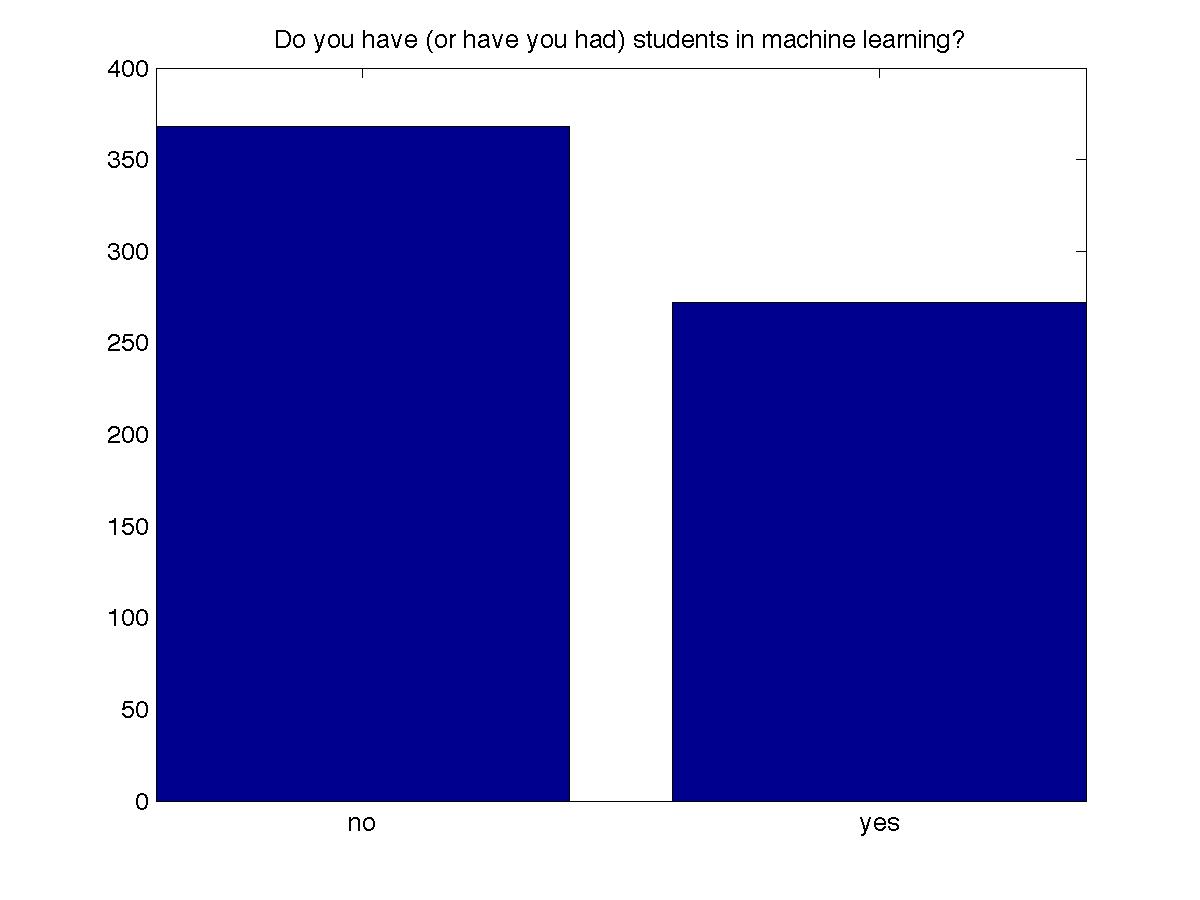 |
|
| Question 6 |
|
| What is your educational background/training/disciplinary background? (You may select more than one) |
| Frequency table |
|
Choices
|
Absolute frequency |
Relative frequency |
Adjusted relative frequency |
|
Biology
|
11 |
0.95% |
1.76% |
|
Cognitive science
|
30 |
2.6% |
4.81% |
|
Computer science
|
460 |
39.86% |
73.72% |
|
Economics
|
11 |
0.95% |
1.76% |
|
Electrical engineering
|
107 |
9.27% |
17.15% |
|
Engineering sciences
|
53 |
4.59% |
8.49% |
|
Machine Learning
|
153 |
13.26% |
24.52% |
|
Mathematics
|
143 |
12.39% |
22.92% |
|
Neuroscience
|
21 |
1.82% |
3.37% |
|
Operations research
|
9 |
0.78% |
1.44% |
|
Physics
|
52 |
4.51% |
8.33% |
|
Psychology
|
8 |
0.69% |
1.28% |
|
Social science
|
5 |
0.43% |
0.8% |
|
Statistics
|
58 |
5.03% |
9.29% |
|
Other:
|
33 |
2.86% |
5.29% |
| Sum: |
1154 |
100% |
100% |
| Total answered: 624 |
| Plot |
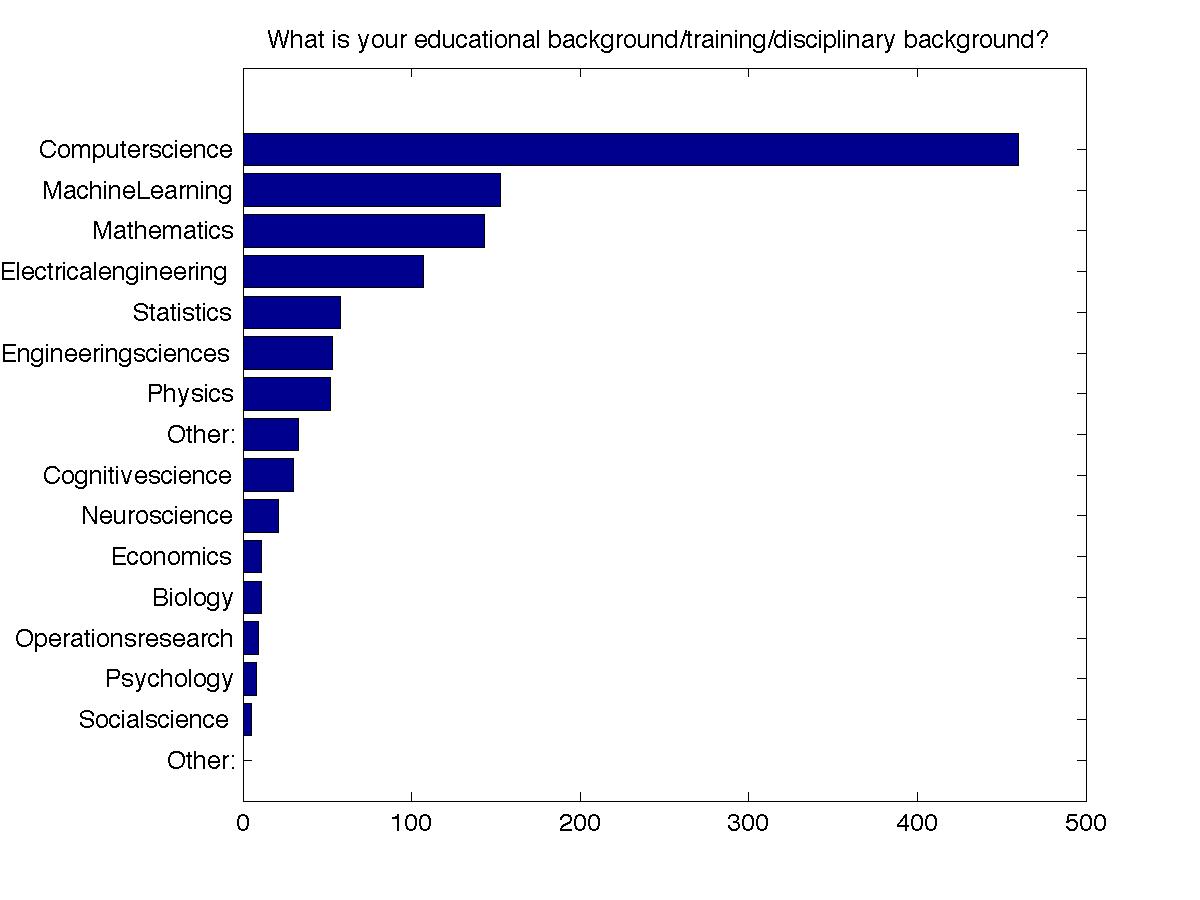 |
|
| Question 7 |
|
| Did your educational background prepare you well for research in machine learning? |
| Frequency table |
|
Levels
|
Absolute frequency |
Relative frequency |
Adjusted relative frequency |
|
1 (Poorly prepared)
|
40 |
5.1% |
6.41% |
|
2
|
133 |
16.96% |
21.31% |
|
3
|
282 |
35.97% |
45.19% |
|
4 (Well prepared)
|
169 |
21.56% |
27.08% |
| Not answered: |
160 |
20.41% |
- |
| Sum: |
784 |
100% |
100% |
| Total answered: 624 |
| Plot |
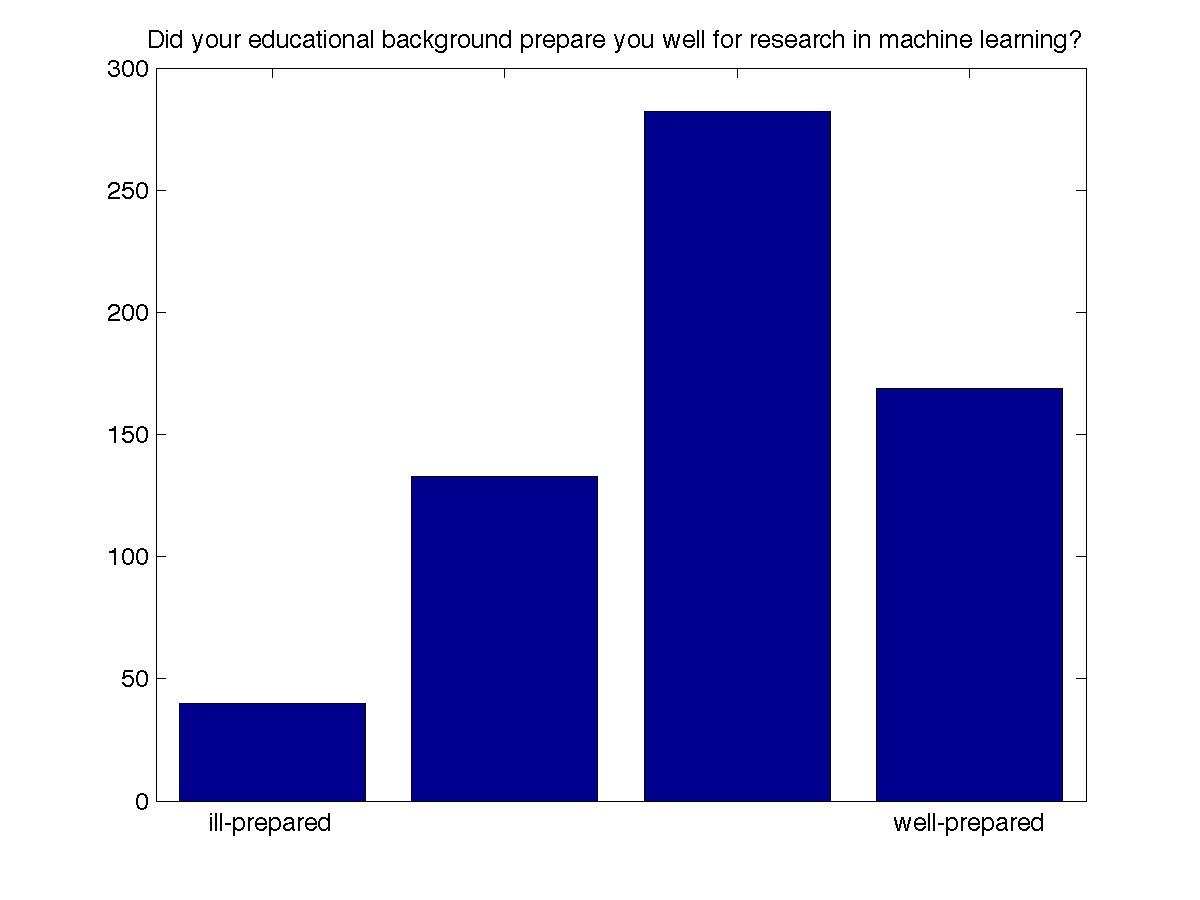 |
|
| Question 8 |
|
| What educational backgrounds do your students have? (You may select more than one) |
| Frequency table |
|
Choices
|
Absolute frequency |
Relative frequency |
Adjusted relative frequency |
|
Biology
|
14 |
2.41% |
5.41% |
|
Cognitive science
|
10 |
1.72% |
3.86% |
|
Computer science
|
220 |
37.93% |
84.94% |
|
Economics
|
6 |
1.03% |
2.32% |
|
Electrical engineering
|
65 |
11.21% |
25.1% |
|
Engineering sciences
|
49 |
8.45% |
18.92% |
|
Machine Learning
|
44 |
7.59% |
16.99% |
|
Mathematics
|
74 |
12.76% |
28.57% |
|
Neuroscience
|
9 |
1.55% |
3.47% |
|
Operations research
|
4 |
0.69% |
1.54% |
|
Physics
|
25 |
4.31% |
9.65% |
|
Psychology
|
7 |
1.21% |
2.7% |
|
Social science
|
1 |
0.17% |
0.39% |
|
Statistics
|
45 |
7.76% |
17.37% |
|
Other:
|
7 |
1.21% |
2.7% |
| Sum: |
580 |
100% |
100% |
| Total answered: 259 |
| Plot |
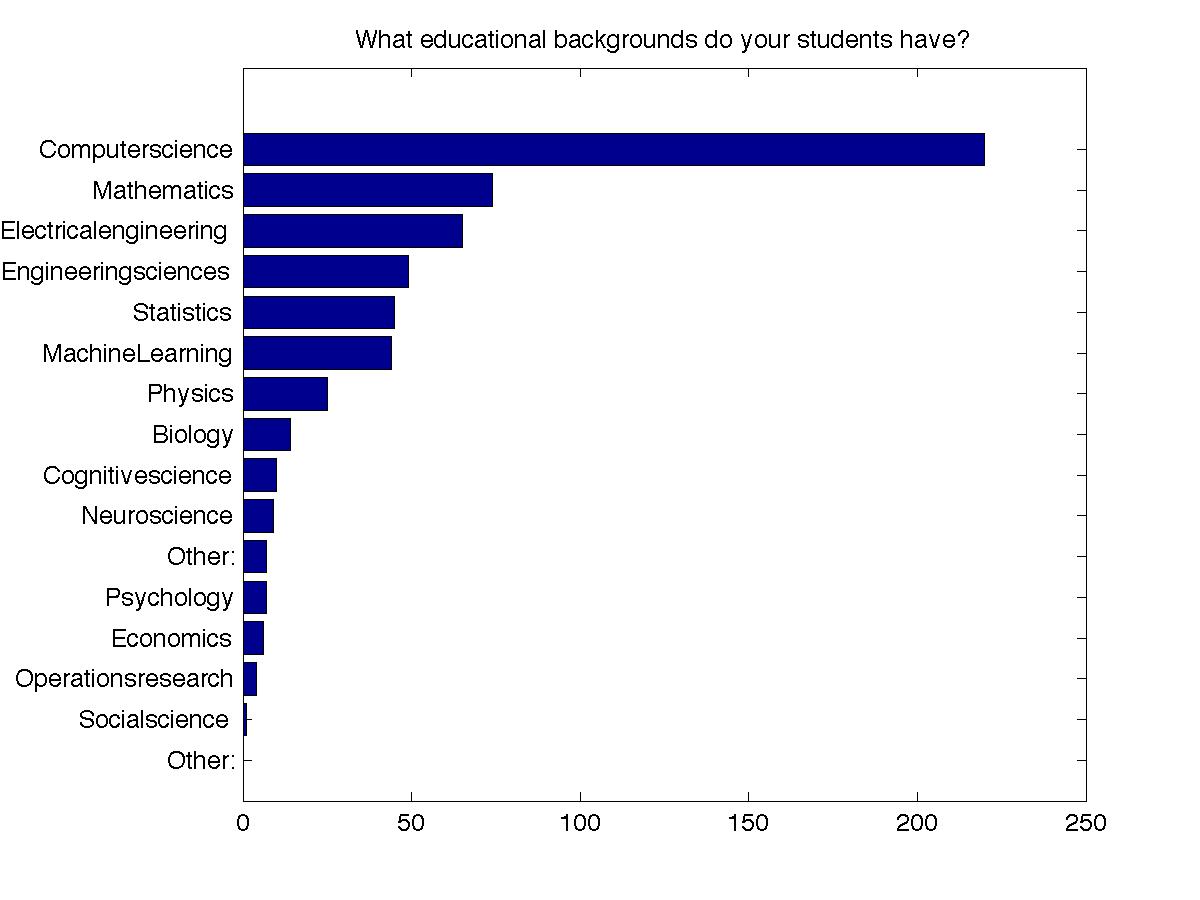 |
|
| Question 9 |
|
| Did the educational backgrounds of your students prepare them well for studying machine learning? |
| Frequency table |
|
Levels
|
Absolute frequency |
Relative frequency |
Adjusted relative frequency |
|
1 (Poorly prepared)
|
18 |
2.3% |
6.95% |
|
2
|
95 |
12.12% |
36.68% |
|
3
|
112 |
14.29% |
43.24% |
|
4 (Well prepared)
|
34 |
4.34% |
13.13% |
| Not answered: |
525 |
66.96% |
- |
| Sum: |
784 |
100% |
100% |
| Total answered: 259 |
| Plot |
 |
|
| Question 10 |
|
| In your opinion, what will constitute good educational backgrounds for a graduate student entering machine learning? (You may select as many as you like). |
| Frequency table |
|
Choices
|
Absolute frequency |
Relative frequency |
Adjusted relative frequency |
|
Biology
|
13 |
0.49% |
2.16% |
|
Cognitive science
|
91 |
3.46% |
15.14% |
|
Computer science
|
503 |
19.14% |
83.69% |
|
Economics
|
20 |
0.76% |
3.33% |
|
Electrical engineering
|
112 |
4.26% |
18.64% |
|
Engineering sciences
|
75 |
2.85% |
12.48% |
|
Machine Learning
|
462 |
17.58% |
76.87% |
|
Mathematics
|
488 |
18.57% |
81.2% |
|
Neuroscience
|
47 |
1.79% |
7.82% |
|
Operations research
|
149 |
5.67% |
24.79% |
|
Physics
|
142 |
5.4% |
23.63% |
|
Psychology
|
21 |
0.8% |
3.49% |
|
Social science
|
15 |
0.57% |
2.5% |
|
Statistics
|
480 |
18.26% |
79.87% |
|
Other:
|
10 |
0.38% |
1.66% |
| Sum: |
2628 |
100% |
100% |
| Total answered: 601 |
| Plot |
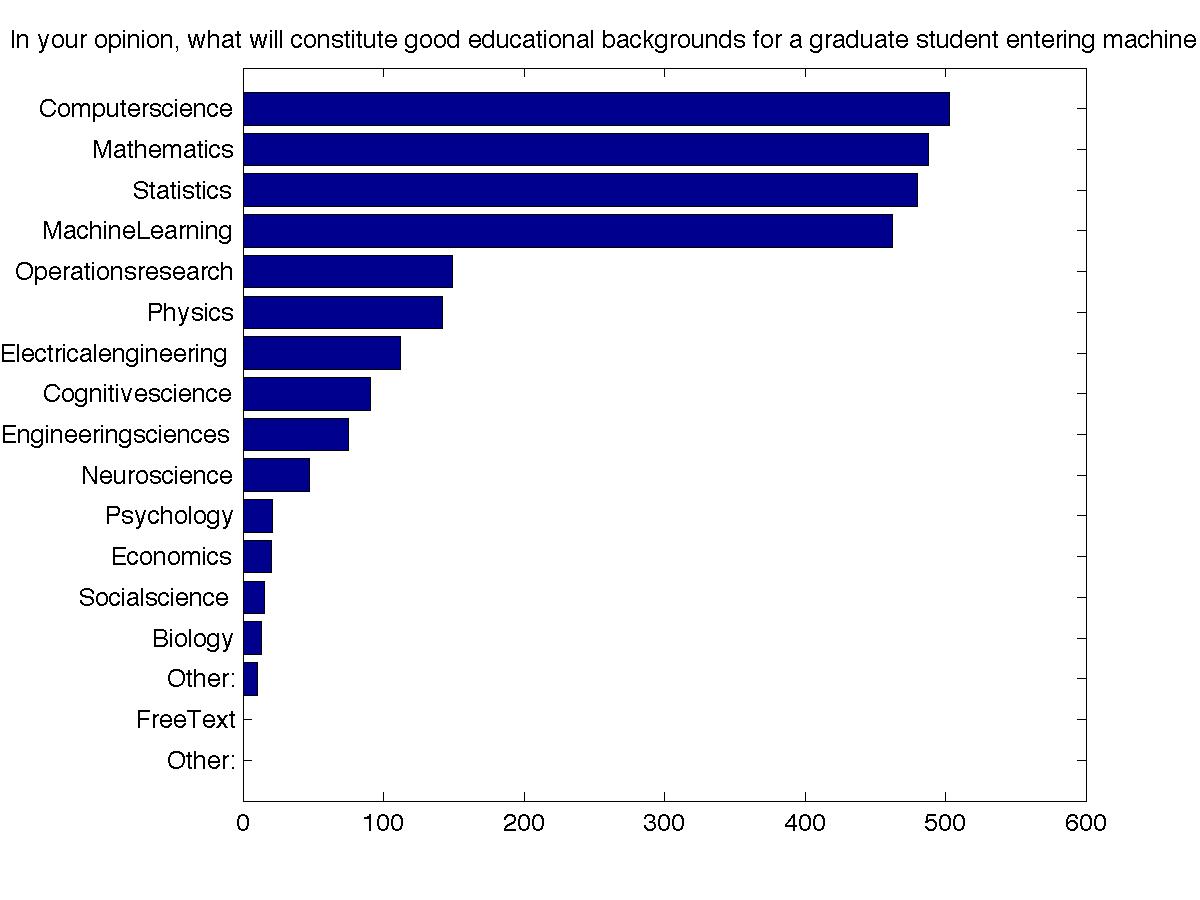 |
|
| Text input |
|
I think that some of the very relevant lecture courses are offered in a variety of disciplines-- so, it might be more a question of "what lectures did they attend" rather than "what degree did they get in the end".
|
|
applied mathematics
|
|
Really any of these could work, it seems to me that the important thing is to have some kind of mathematical and computational background, and to have been exposed to the issues involved in working on problems with a large number of variables.
|
|
Above answers are for "core" ML - others are useful as application areas, etc.
|
|
Some basic courses in optimization and Decision Sciences too are significant in Machine Learning
|
Actually, I think many different backgrounds could be beneficial for the community.
This seems to be the most obvious to me, though.
|
|
I'm inclined to select almost all of them. Some experience in Maths is the only common denominator I see in all of them.
|
|
have studied the area of the application
|
|
The most essential things are mathematics and programming skills.
|
|
It depends on the focus - I answered for more theoretically inclined machine learning but some researchers are interested in biological systems or in the learning done in the human brain, for them other disciplines are relevant.
|
|
This is hard to answer with a binary tick mark because "goodness" is continuous and qualitative. If I had to order the goodness of background then I would say machine learning > statistics > computer science > physics > maths > electrical engineering.
|
|
Encountered many people with very weak math preparation due to coming from undergrad computer science background, which offers exceedingly poor math preparation even at top universities. Often run into (otherwise good and motivated) machine learning graduate students with very poor understanding of linear algebra other than the most basic symbol pushing, dodgy understanding of what random variables are, and essentially no capacity to absorb more sophisticated concepts like RKHS, Bayesian nonparametrics, etc.
|
|
Possibly plus some knowledge of a domain. E.g. economics, biology, neuroscience... Exactly which domain probably doesn't matter.
|
|
Later on, one has to learn about the application, too. But since applications are widespread, one cannot know everything beforehand. My biology knowledge has helped me partially.
|
|
basic knowledge of probability theory, statistics, algorithmics and linear algebra is extremely important
|
|
In my opinion, as machine learning involves a lot of work with maths and a lot of work computers, general maths and general computer science should be seen as necessary fundamentals. The general maths could also be obtained in different fields, e.g. physics. Statistics, especially statistics with a extensive use of probability theory (which I take to be synonymous with Bayesian statistics) is the most valuable more specialized discipline.
|
|
Computer science training is essential because MLer need to do coding.
|
|
Continuous mathematics taught in EE / Physics is much more important than Computer Science.
|
|
From my perspective, a requrement for success is first of all a pure or "semi-pure" mathematic background (incl basic statstics) combined with a more physical aspect such as physics or EE a good basis. Computer Science is to broard to be mentioned, yet of course important as a pratical tool. But the mathematics seems to be more and more important to understand the very complicated models.
|
|
I guess Machine Learning would prepare a student well for Machine Learning. However, since that is non-informative, I chose disciplines OTHER THAN Machine Learning that would give a student a strong enough background to do well in Machine Learning.
|
|
All the fields might be highly relevant depending on what you want to do with machine learning. I marked the ones which I think are the most important ones.
|
|
The most difficult things to teach are: mathematical fluency, hacking. Students can pick these up in any of the above disciplines, but not all do.
|
|
CS students lack math and stat; "machine learning" students lack CS and logic and the ability to model.
|
|
it is clear from your questions that you want the data to show that CS (as traditionally taught) is a poor preparation for machine learning research, which requires much more math than most CS ugrads ever see... I agree with this point of view. However, one could also argue that stats as an ugrad subject does not produce students with enough curiosity or computer skills
|
|
Maths is crucial
|
|
Good teaching is important.
|
|
Most computer science and engineering programs do not seem to produce good machine learning researcher candidates. Instead, the best ones typically come with math/physics/statistics background.
|
|
"Machine Learning" is a good educational background for "machine learning"? :)
|
|
I believe that one can enter machine learning from many directions. What is important is some mathematical maturity, and the willingness to get one's hands dirty in several things, e.g. proving some theory, writing some code, and modeling some real world problem. Backgrounds that prepare students for either one of the three areas above would work well.
|
|
CS would be nice, but as it is taught right now, most student lack all of continuous math
|
|
A solid mathematical background and the ability to write code are most important in my opinion.
|
|
Knowledge of: neural networks, statistics, computational neuroscience, computer programming, mathematical optimization, game theory, information theory, artificial intelligence, computational intelligence, machine learning, complexity theory. Some knowledge of engineering and physics might be advantageous.
|
|
no.
|
"Mathematics" and "Physics" are big domains! How about "scientific computing", "optimization"?
I don't see what social science has to do with ML. By far the most useful background for ML
is Physics, unfortunately I had little luck so far to recruit such students. The great perspective of ML is too little visible for physics students.
|
|
Specifically, a solid understanding of both linear algebra and significant programming experience as a hobby, not as a job, are the right combination. It is hard to find both together. Those who lack the math skills will spend all their time catching up, while the types who choose to use high-level programming languages rarely have drive sufficient to undertake ambitious projects.
|
|
Strong abilities in theoretical fields : almost all effective and usefull advances in ML come from fine mathematical properties cleverly used.
|
|
It's all about math and stats. Neuroscience and biology, etc., offer convenient high-level metaphors for some approaches, but they disappear when you look at the details.
|
|
practical experiences, e.g. with one of the many ml competitions cannot be overvalued
|
Mathematics is the most important, the earlier, the most one do math the better for ML.
Then, stats and optimization are the most important.
The only thing that matter in CS is awareness to computational complexity.
|
Learning methods
computer-human learning
|
|
The fields I chose will give a good fundamental background in machine learning, though a background in the other fields listed will give imperative domain knowledge and at least one should be studied in some depth.
|
|
Good mathematics and computer science background really help students in entering machine learning
|
|
Applied mathematics; data-driven thinking
|
|
What I've missed the most is a mathematically rigorous, unified introduction to statistics and the parts of machine learning closest to statistics.
|
I think Biology, Social science and Neuroscience are really application areas
Economics and Psychology have some value in understanding subjective probability, utility etc...
The other areas are highly overlapping with each other and all provide a good background in machine learning....
|
|
Bayesian Statistics
|
Ranking: Statistics, Mathematics, Electrical Engineering
(I'm not quite sure what the curriculum in machine learning would all contain. But obviously, it should be a good preparation!)
|
|
What you need is strong math & coding skills
|
|
Difficult to offer the perfect background at the master level. Good graduate courses and summer schools are important at the beginning of a PhD. Further education in additional domains (e.g. biology) are also useful for related applications (e.g. biomedical problems)
|
|
statistical physics in particular.
|
|
Maths, Maths and Maths. And statistics. I don't have a solid background in it and thus need to catch-up everything now. If I had pure mathematics foundations, this would greatly benefit my understanding and development of machine learning methods and applications.
|
|
Statistics is really important... In Iran it didn't receive much attention in my undergrad school but I studied hard myself.
|
To be useful to me students need strong enough maths (calculus, linear alg, porbability, stats)
and CS (programming, but also algorithms ideas) to do the technical work. If they have that, background in e.g. cog sci can be helpful as a source of ideas/motivations.
|
|
| Question 11 |
|
| What area(s) in machine learning do you work in? (You may select more than one) |
| Frequency table |
|
Choices
|
Absolute frequency |
Relative frequency |
Adjusted relative frequency |
|
Bayesian statistics
|
235 |
8.95% |
42.27% |
|
Control and planning
|
71 |
2.7% |
12.77% |
|
Deep learning
|
35 |
1.33% |
6.29% |
|
Dimensionality reduction
|
148 |
5.64% |
26.62% |
|
Graphical models
|
218 |
8.3% |
39.21% |
|
Information theory
|
60 |
2.29% |
10.79% |
|
Kernel methods
|
125 |
4.76% |
22.48% |
|
Learning theory
|
87 |
3.31% |
15.65% |
|
Manifold learning
|
37 |
1.41% |
6.65% |
|
Model selection
|
102 |
3.89% |
18.35% |
|
Neural networks
|
101 |
3.85% |
18.17% |
|
Nonparametric methods
|
106 |
4.04% |
19.06% |
|
Online learning
|
110 |
4.19% |
19.78% |
|
Optimization
|
115 |
4.38% |
20.68% |
|
Reinforcement learning
|
118 |
4.5% |
21.22% |
|
Relational learning
|
66 |
2.51% |
11.87% |
|
Semisupervised learning
|
116 |
4.42% |
20.86% |
|
Sparse learning
|
86 |
3.28% |
15.47% |
|
Statistical physics of learning
|
10 |
0.38% |
1.8% |
|
Structured learning
|
99 |
3.77% |
17.81% |
|
Supervised learning
|
241 |
9.18% |
43.35% |
|
Time series modelling
|
108 |
4.11% |
19.42% |
|
Unsupervised learning
|
211 |
8.04% |
37.95% |
|
Other:
|
20 |
0.76% |
3.6% |
| Sum: |
2625 |
100% |
100% |
| Total answered: 556 |
| Plot |
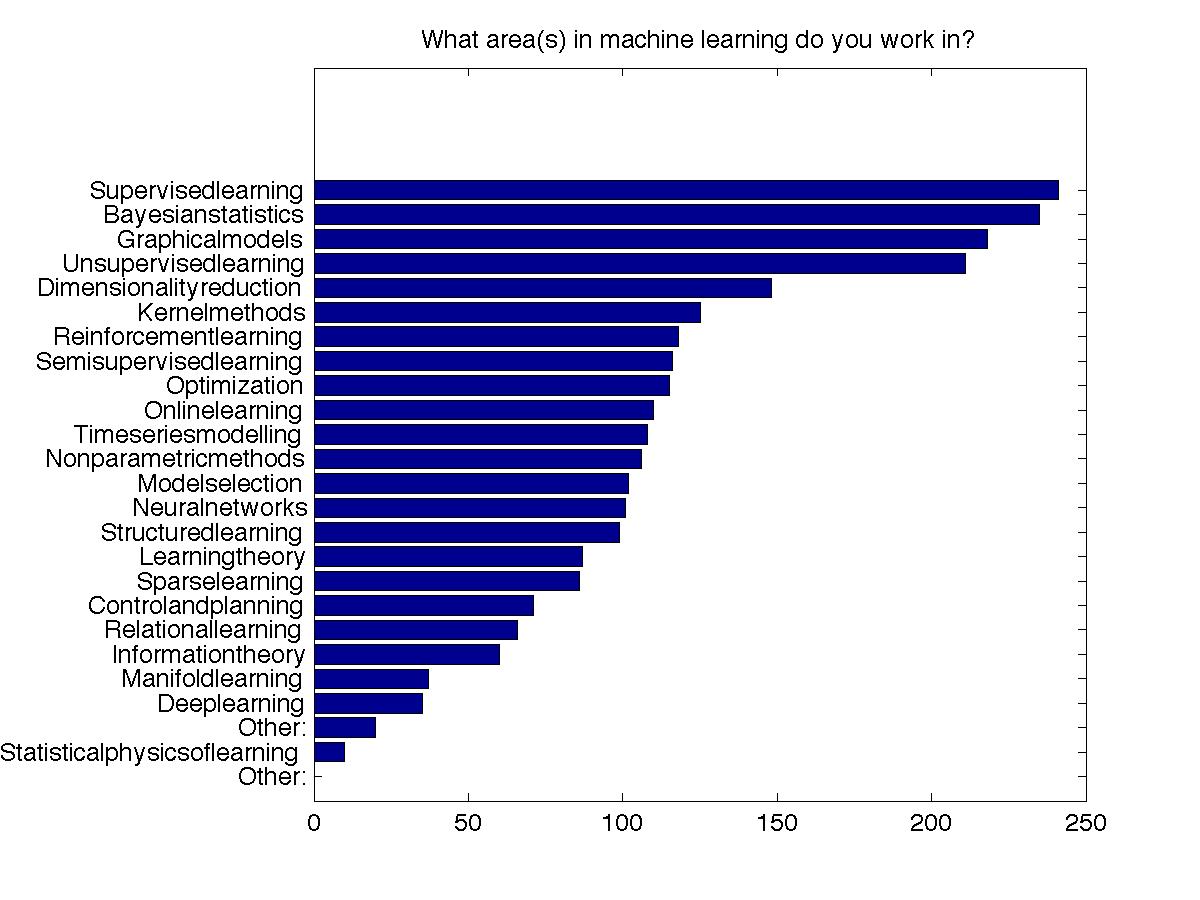 |
|
| Question 12 |
|
| What other area(s) do you work in? (You may select more than one) |
| Frequency table |
|
Choices
|
Absolute frequency |
Relative frequency |
Adjusted relative frequency |
|
None
|
19 |
0.96% |
3.41% |
|
Artificial intelligence
|
163 |
8.26% |
29.26% |
|
Bioinformatics
|
88 |
4.46% |
15.8% |
|
Brain, medical imaging
|
41 |
2.08% |
7.36% |
|
Cognitive science
|
37 |
1.87% |
6.64% |
|
Collaborative filtering
|
48 |
2.43% |
8.62% |
|
Communications
|
12 |
0.61% |
2.15% |
|
Computer vision
|
107 |
5.42% |
19.21% |
|
Computer science
|
169 |
8.56% |
30.34% |
|
Databases
|
19 |
0.96% |
3.41% |
|
Data mining
|
154 |
7.8% |
27.65% |
|
Electrical engineering
|
30 |
1.52% |
5.39% |
|
Genetics
|
30 |
1.52% |
5.39% |
|
Hardware technologies
|
4 |
0.2% |
0.72% |
|
Multimedia processing
|
19 |
0.96% |
3.41% |
|
Linguistics
|
41 |
2.08% |
7.36% |
|
Image processing
|
66 |
3.34% |
11.85% |
|
Information retrieval
|
98 |
4.96% |
17.59% |
|
Mathematics
|
35 |
1.77% |
6.28% |
|
Natural language processing
|
119 |
6.03% |
21.36% |
|
Network analysis
|
37 |
1.87% |
6.64% |
|
Neural data analysis
|
23 |
1.17% |
4.13% |
|
Neuroprosthetics
|
5 |
0.25% |
0.9% |
|
Neuroscience
|
48 |
2.43% |
8.62% |
|
Operations research
|
25 |
1.27% |
4.49% |
|
Physics
|
6 |
0.3% |
1.08% |
|
Psychology
|
24 |
1.22% |
4.31% |
|
Robotics
|
56 |
2.84% |
10.05% |
|
Signal processing
|
80 |
4.05% |
14.36% |
|
Social science
|
29 |
1.47% |
5.21% |
|
Speech processing
|
39 |
1.98% |
7% |
|
Statistics
|
109 |
5.52% |
19.57% |
|
Systems biology
|
29 |
1.47% |
5.21% |
|
Text and web analysis
|
136 |
6.89% |
24.42% |
|
Other:
|
29 |
1.47% |
5.21% |
| Sum: |
1974 |
100% |
100% |
| Total answered: 557 |
| Plot |
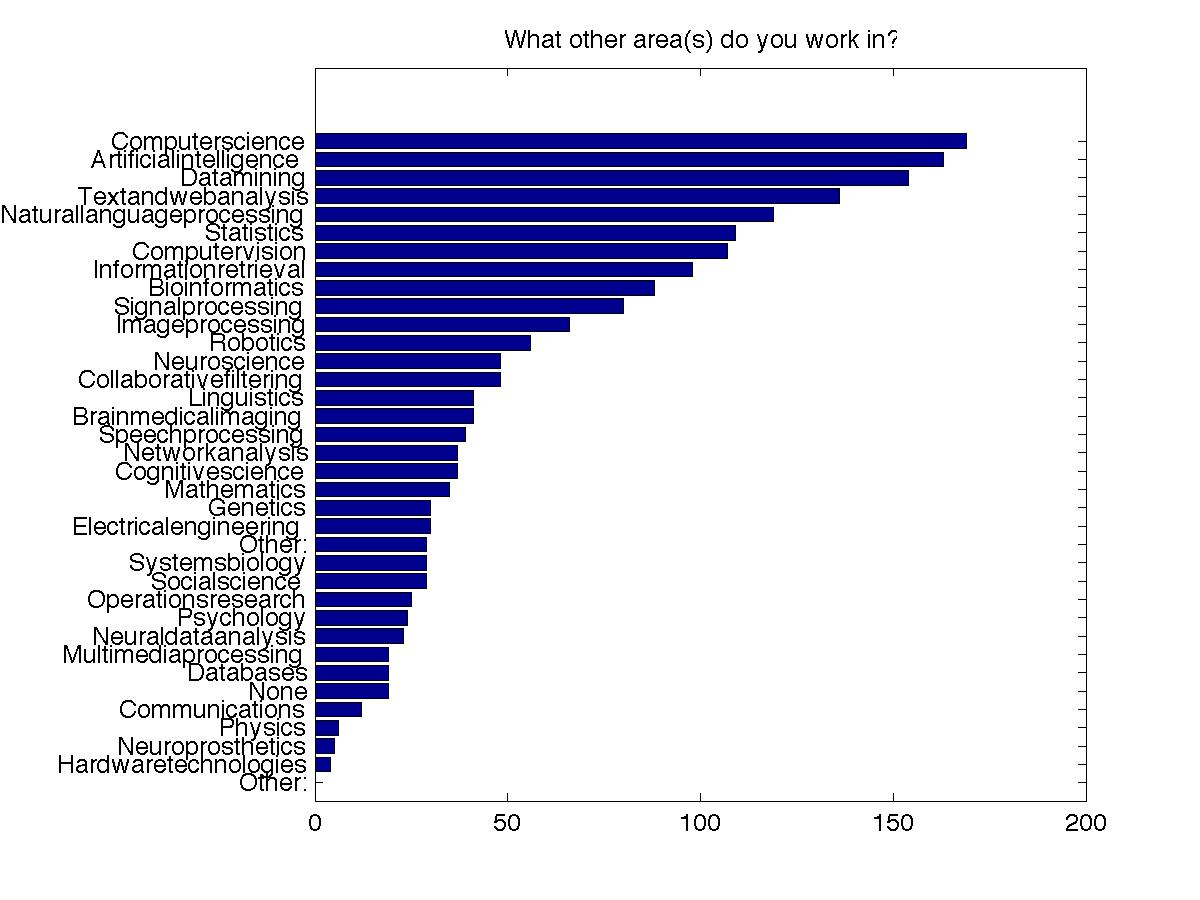 |
|
| Question 13 |
|
| In your opinion, what are core (foundation) areas of machine learning? (You may select as many as you see fit) |
| Frequency table |
|
Choices
|
Absolute frequency |
Relative frequency |
Adjusted relative frequency |
|
Bayesian statistics
|
359 |
9.48% |
64.68% |
|
Control and planning
|
69 |
1.82% |
12.43% |
|
Deep learning
|
48 |
1.27% |
8.65% |
|
Dimensionality reduction
|
155 |
4.09% |
27.93% |
|
Graphical models
|
245 |
6.47% |
44.14% |
|
Information theory
|
224 |
5.91% |
40.36% |
|
Kernel methods
|
200 |
5.28% |
36.04% |
|
Learning theory
|
326 |
8.61% |
58.74% |
|
Manifold learning
|
49 |
1.29% |
8.83% |
|
Model selection
|
167 |
4.41% |
30.09% |
|
Neural networks
|
113 |
2.98% |
20.36% |
|
Nonparametric methods
|
128 |
3.38% |
23.06% |
|
Online learning
|
127 |
3.35% |
22.88% |
|
Optimization
|
283 |
7.47% |
50.99% |
|
Reinforcement learning
|
190 |
5.02% |
34.23% |
|
Relational learning
|
53 |
1.4% |
9.55% |
|
Semisupervised learning
|
127 |
3.35% |
22.88% |
|
Sparse learning
|
70 |
1.85% |
12.61% |
|
Statistical physics of learning
|
44 |
1.16% |
7.93% |
|
Structured learning
|
89 |
2.35% |
16.04% |
|
Supervised learning
|
326 |
8.61% |
58.74% |
|
Time series modelling
|
67 |
1.77% |
12.07% |
|
Unsupervised learning
|
295 |
7.79% |
53.15% |
|
Other:
|
34 |
0.9% |
6.13% |
| Sum: |
3788 |
100% |
100% |
| Total answered: 555 |
| Plot |
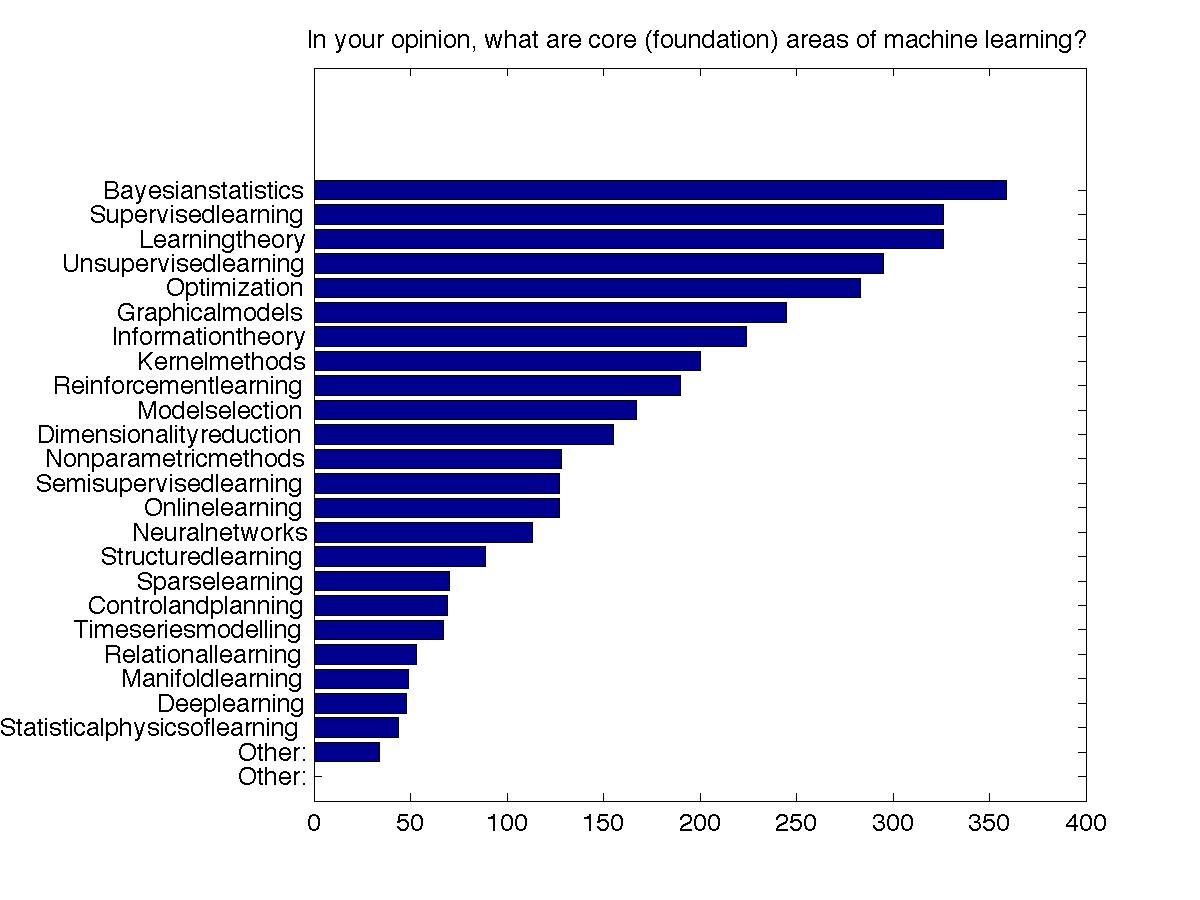 |
| Text input |
| Hard to Say |
| Statistics |
| all of them |
| Artificial Intelligence |
| Probability Theory, Theory of frequentist statistics |
| Preference learning |
| active learning |
| Everything is a core |
| Statistics, Search, Probability Theory |
| - |
| these are too specific |
| High dimensional integration |
| No clear opinion, sorry |
| Pattern Recognition |
| statistics (may be non-Bayesian) |
| Numerical methods, probability |
| Complexity |
| soft computing |
| most of the above |
| pattern recognition |
| multi dimensional statistics |
| State-space search |
| not interested in replying |
| statistics (not necessarily Bayes), mathematics, geometry, decision theory |
| these are all subareas of machine learning. No one is more core than another. |
| stats, maths especially optimization, CS |
| Empirical process theory |
| Real Analysis |
| Mathematics |
| All |
|
| Question 14 |
|
| In your opinion, machine learning is a subfield of statistics. |
| Frequency table |
|
Levels
|
Absolute frequency |
Relative frequency |
Adjusted relative frequency |
|
1 (Disagree)
|
69 |
8.8% |
12.73% |
|
2
|
135 |
17.22% |
24.91% |
|
3
|
230 |
29.34% |
42.44% |
|
4 (Agree)
|
108 |
13.78% |
19.93% |
| Not answered: |
242 |
30.87% |
- |
| Sum: |
784 |
100% |
100% |
| Total answered: 542 |
| Plot |
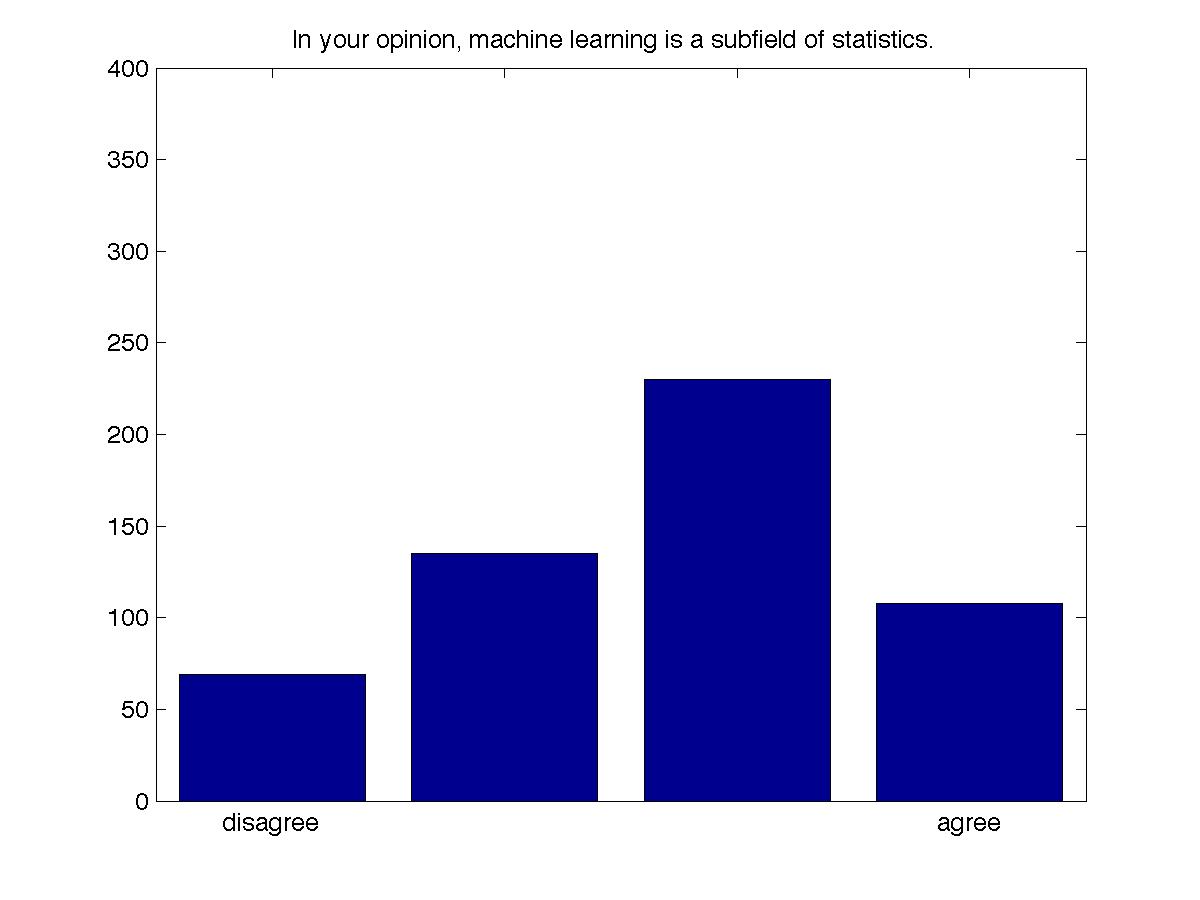 |
|
| Question 15 |
|
| In your opinion, machine learning is a subfield of computer science. |
| Frequency table |
|
Levels
|
Absolute frequency |
Relative frequency |
Adjusted relative frequency |
|
1 (Disagree)
|
40 |
5.1% |
7.38% |
|
2
|
98 |
12.5% |
18.08% |
|
3
|
231 |
29.46% |
42.62% |
|
4 (Agree)
|
173 |
22.07% |
31.92% |
| Not answered: |
242 |
30.87% |
- |
| Sum: |
784 |
100% |
100% |
| Total answered: 542 |
| Plot |
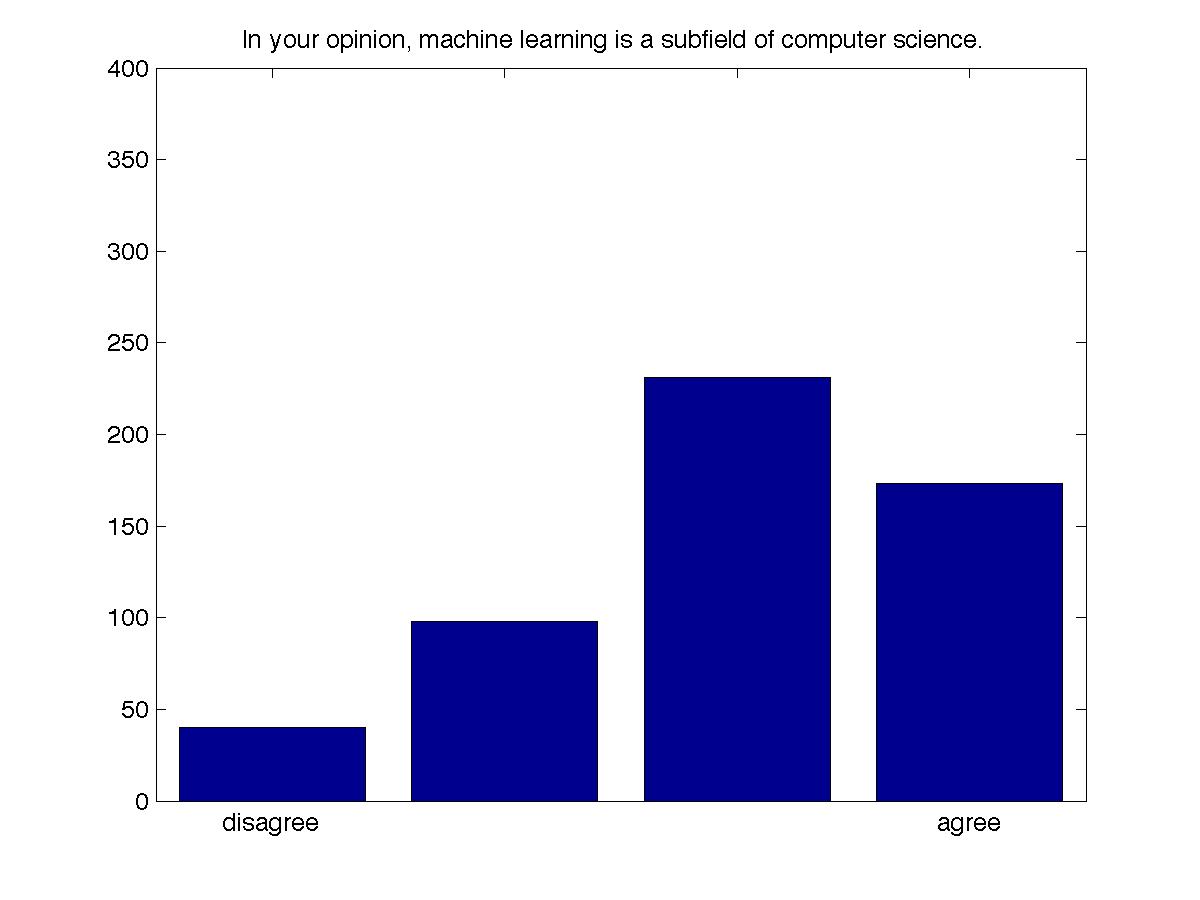 |
|
| Question 16 |
|
| In your opinion, machine learning is a subfield of cognitive science. |
| Frequency table |
|
Levels
|
Absolute frequency |
Relative frequency |
Adjusted relative frequency |
|
1 (Disagree)
|
238 |
30.36% |
43.91% |
|
2
|
199 |
25.38% |
36.72% |
|
3
|
82 |
10.46% |
15.13% |
|
4 (Agree)
|
23 |
2.93% |
4.24% |
| Not answered: |
242 |
30.87% |
- |
| Sum: |
784 |
100% |
100% |
| Total answered: 542 |
| Plot |
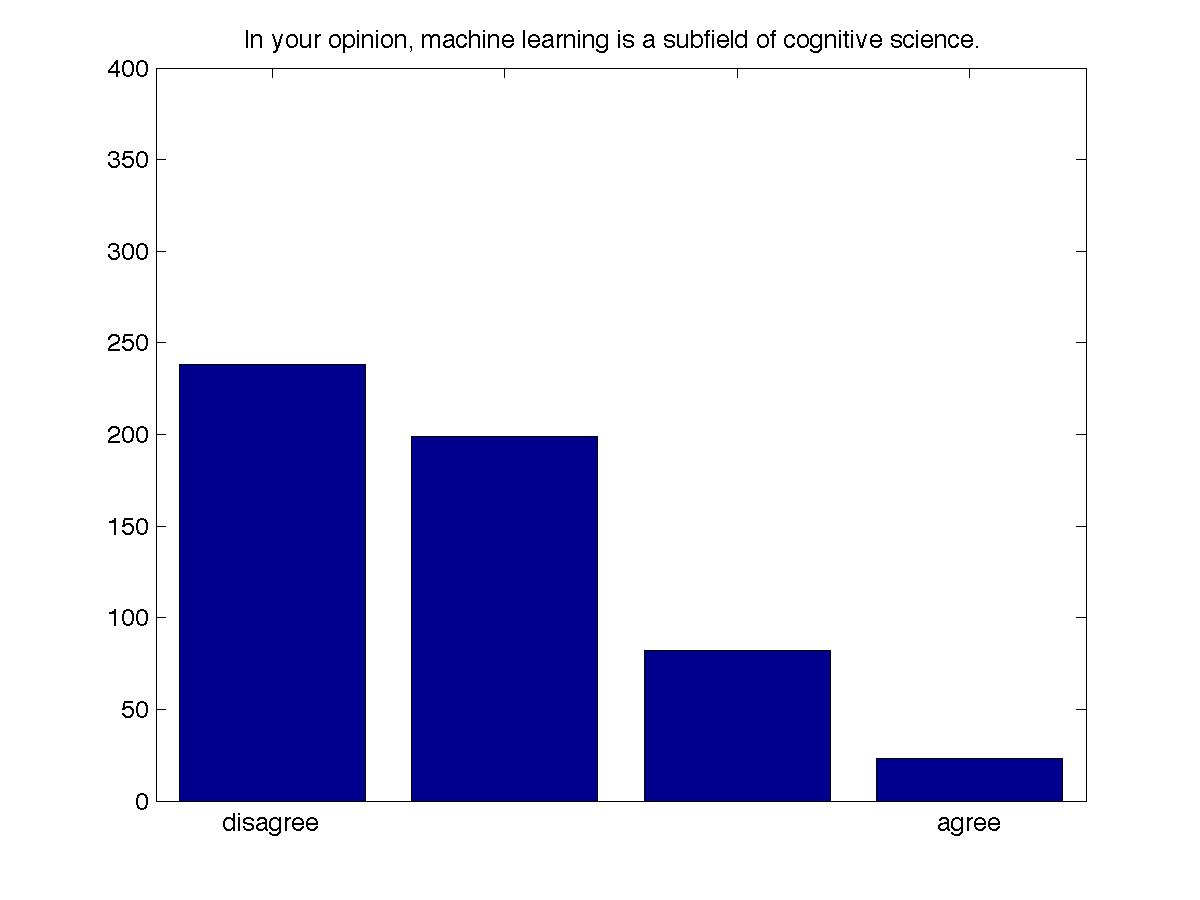 |
|
| Question 17 |
|
| In your opinion, machine learning is a subfield of neuroscience. |
| Frequency table |
|
Levels
|
Absolute frequency |
Relative frequency |
Adjusted relative frequency |
|
1 (Disagree)
|
307 |
39.16% |
56.64% |
|
2
|
170 |
21.68% |
31.37% |
|
3
|
54 |
6.89% |
9.96% |
|
4 (Agree)
|
11 |
1.4% |
2.03% |
| Not answered: |
242 |
30.87% |
- |
| Sum: |
784 |
100% |
100% |
| Total answered: 542 |
| Plot |
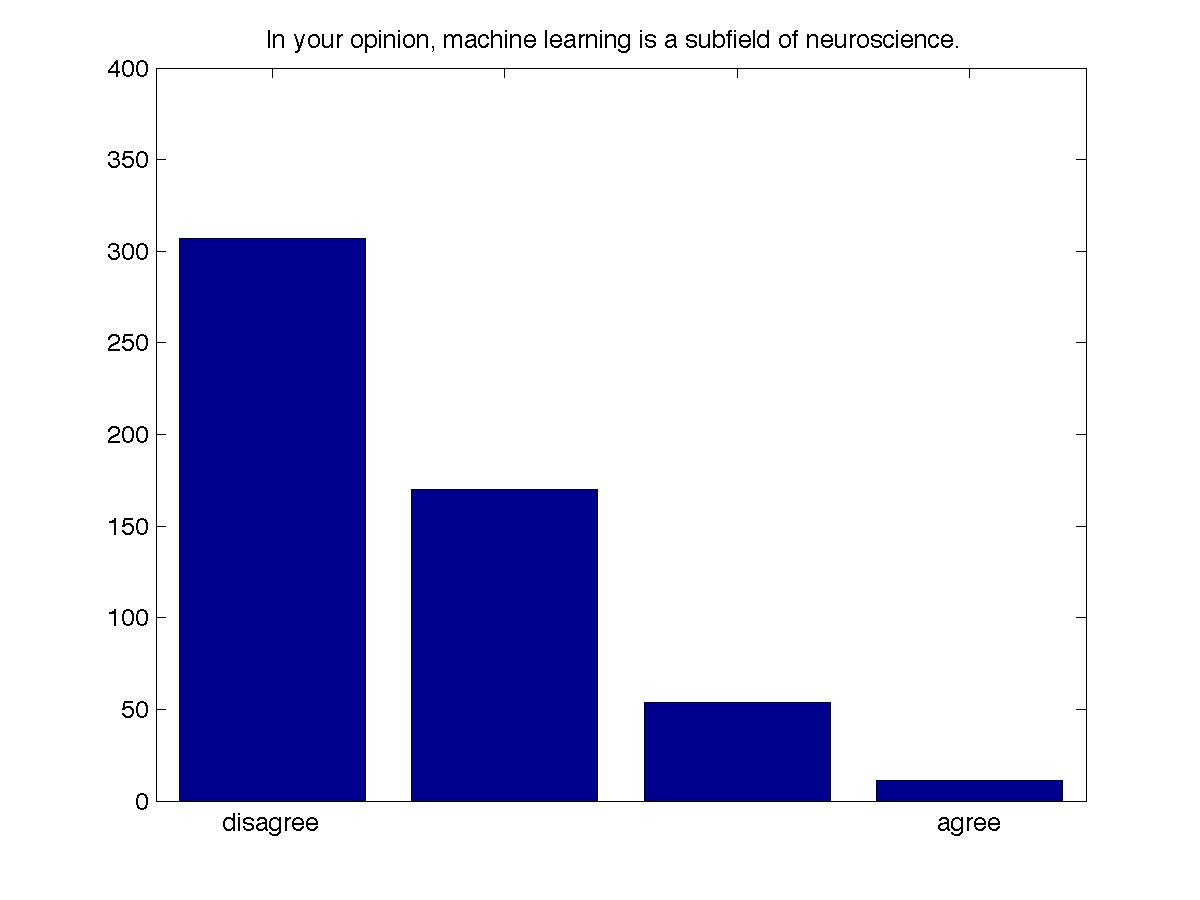 |
|
| Question 18 |
|
| In your opinion, machine learning is a subfield of engineering. |
| Frequency table |
|
Levels
|
Absolute frequency |
Relative frequency |
Adjusted relative frequency |
|
1 (Disagree)
|
155 |
19.77% |
28.6% |
|
2
|
176 |
22.45% |
32.47% |
|
3
|
150 |
19.13% |
27.68% |
|
4 (Agree)
|
61 |
7.78% |
11.25% |
| Not answered: |
242 |
30.87% |
- |
| Sum: |
784 |
100% |
100% |
| Total answered: 542 |
| Plot |
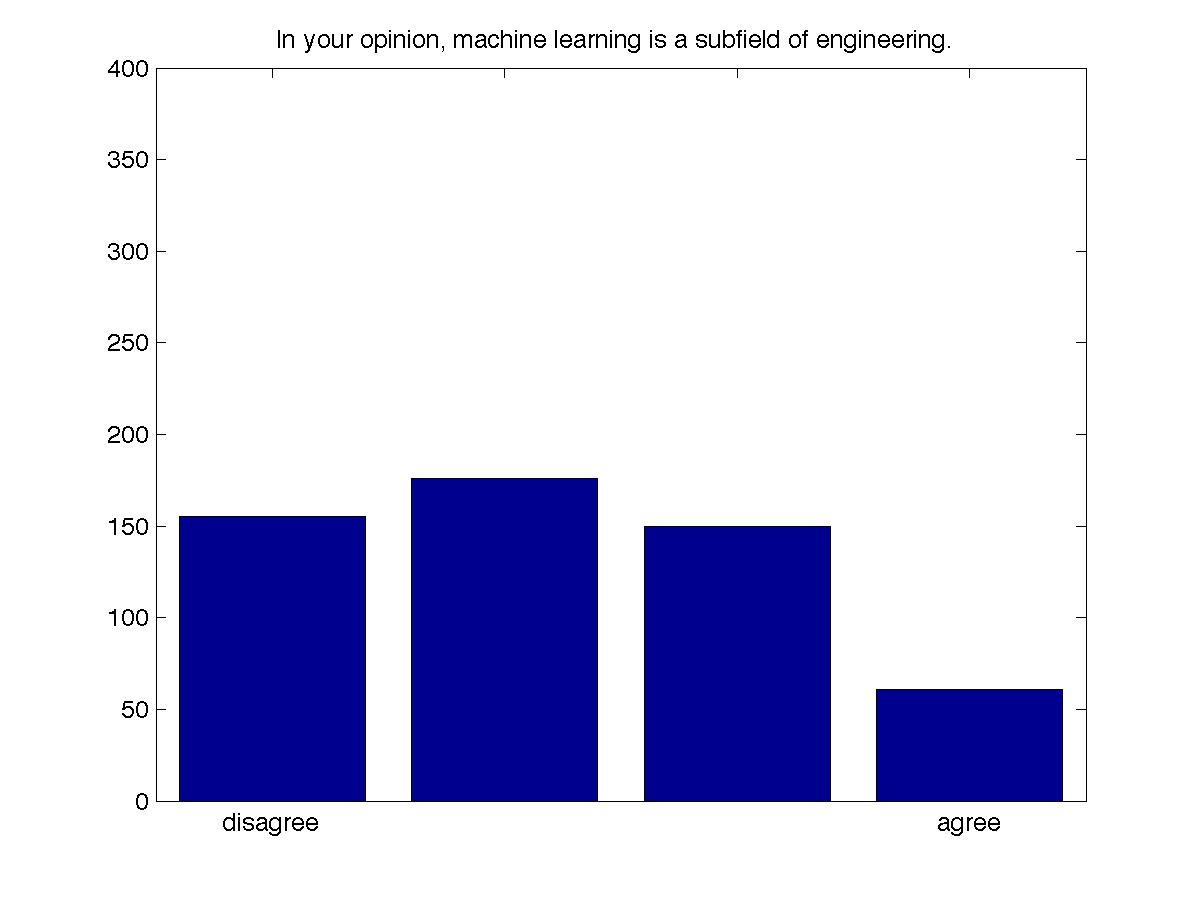 |
|
| Question 19 |
|
| In your opinion, machine learning is a subfield of artificial intelligence. |
| Frequency table |
|
Levels
|
Absolute frequency |
Relative frequency |
Adjusted relative frequency |
|
1 (Disagree)
|
50 |
6.38% |
9.21% |
|
2
|
88 |
11.22% |
16.21% |
|
3
|
213 |
27.17% |
39.23% |
|
4 (Agree)
|
192 |
24.49% |
35.36% |
| Not answered: |
241 |
30.74% |
- |
| Sum: |
784 |
100% |
100% |
| Total answered: 543 |
| Plot |
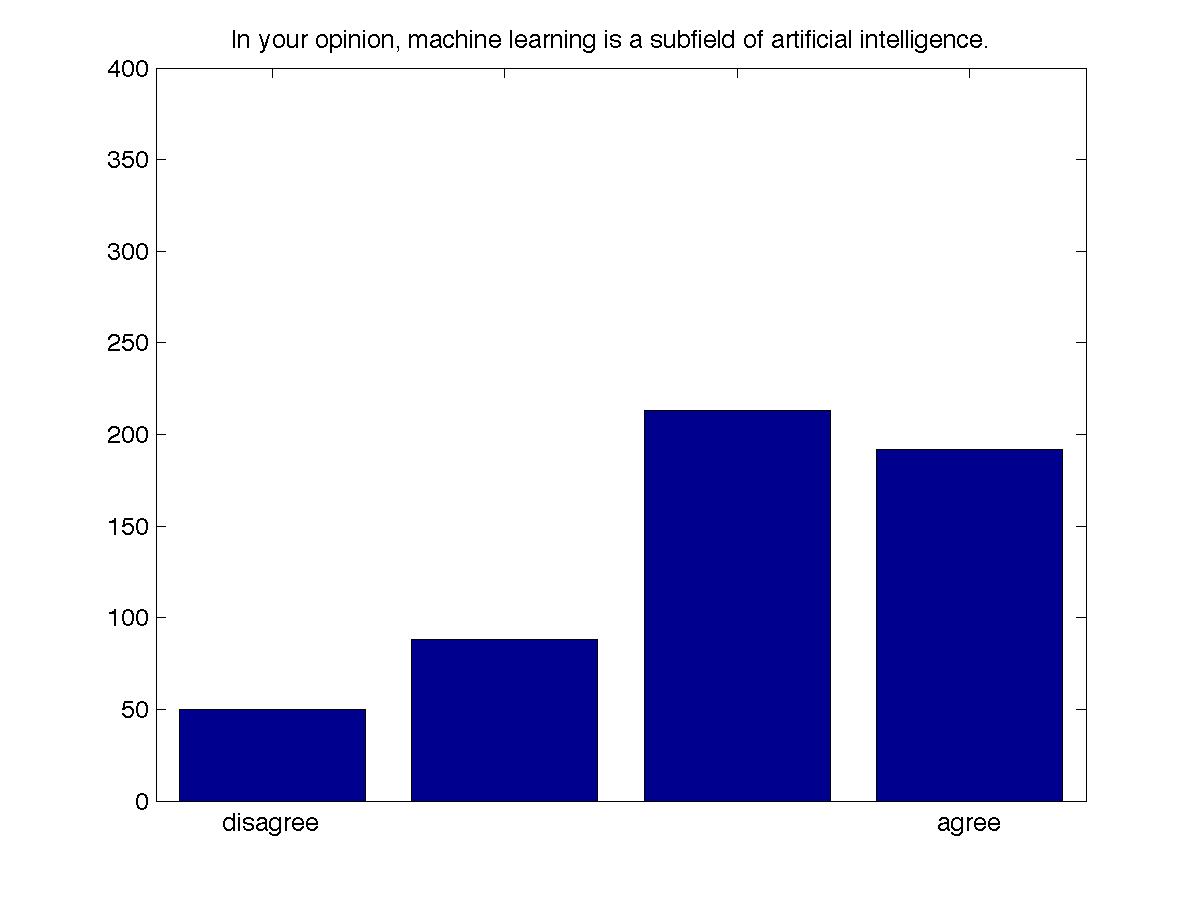 |
|
| Question 20 |
|
| In your opinion, machine learning is an interdisciplinary area. |
| Frequency table |
|
Levels
|
Absolute frequency |
Relative frequency |
Adjusted relative frequency |
|
1 (Disagree)
|
5 |
0.64% |
0.92% |
|
2
|
25 |
3.19% |
4.61% |
|
3
|
122 |
15.56% |
22.51% |
|
4 (Agree)
|
390 |
49.74% |
71.96% |
| Not answered: |
242 |
30.87% |
- |
| Sum: |
784 |
100% |
100% |
| Total answered: 542 |
| Plot |
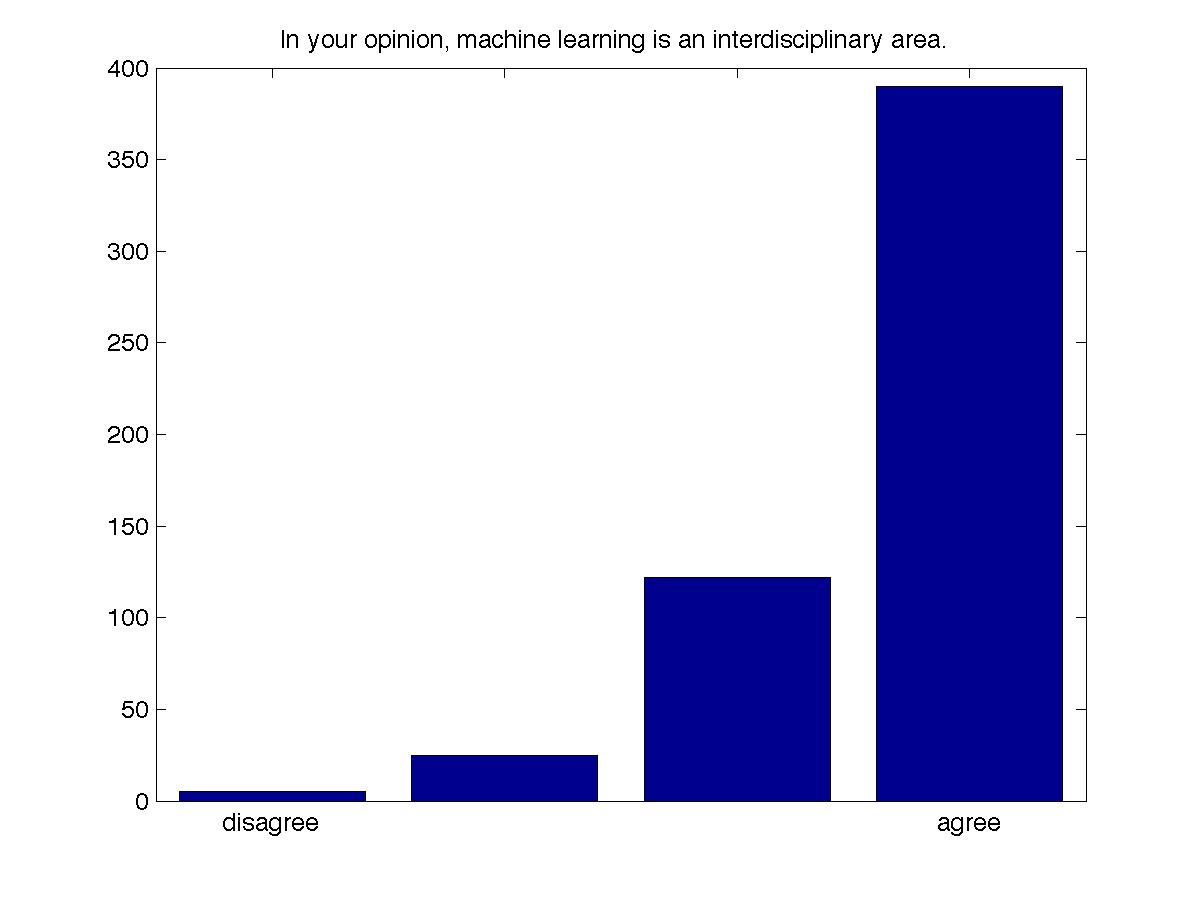 |
|
| Question 21 |
|
| In your opinion, machine learning is a a discipline distinct from other disciplines. |
| Frequency table |
|
Levels
|
Absolute frequency |
Relative frequency |
Adjusted relative frequency |
|
1 (Disagree)
|
103 |
13.14% |
19% |
|
2
|
181 |
23.09% |
33.39% |
|
3
|
158 |
20.15% |
29.15% |
|
4 (Agree)
|
100 |
12.76% |
18.45% |
| Not answered: |
242 |
30.87% |
- |
| Sum: |
784 |
100% |
100% |
| Total answered: 542 |
| Plot |
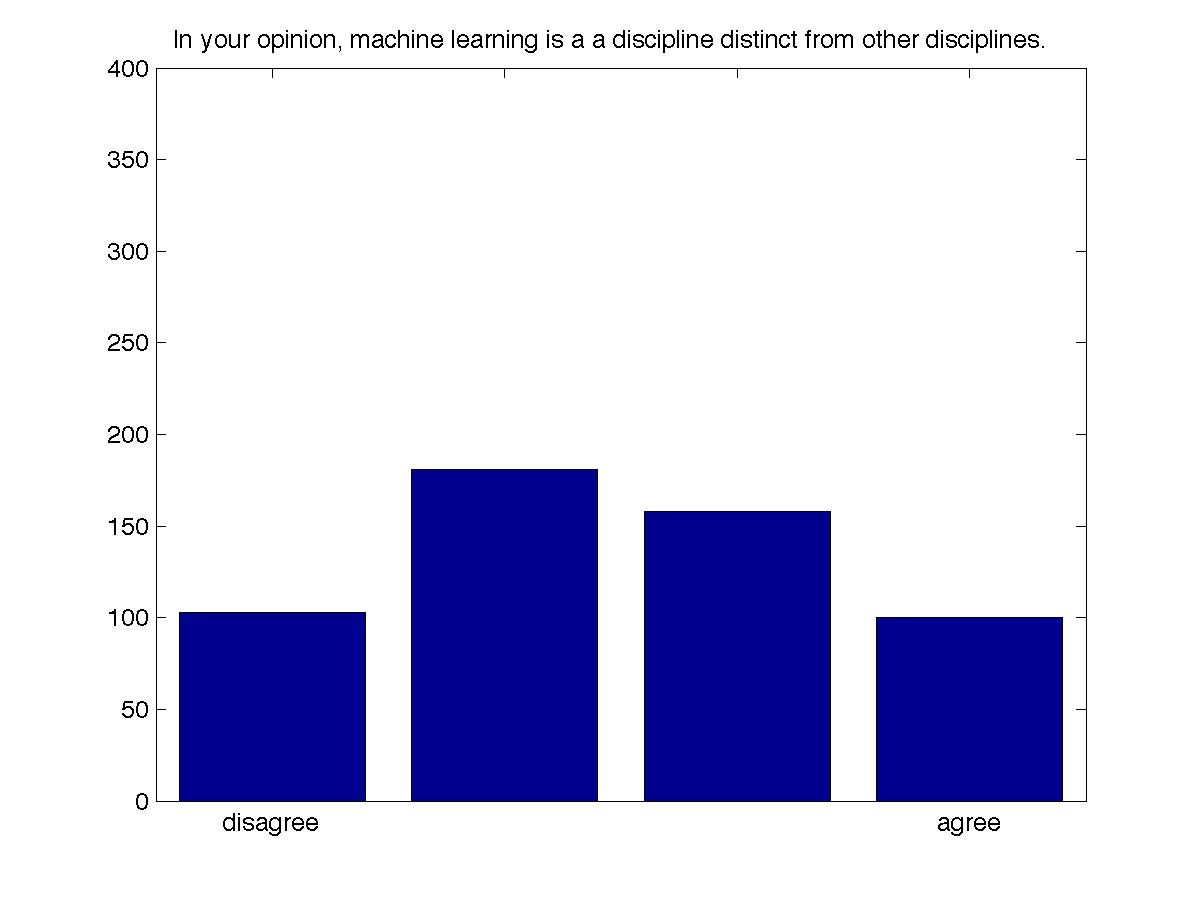 |
|
| Question 22 |
|
| Any further comments regarding the relationship of machine learning to other disciplines? |
|
|
| Text input |
|
I think that the answer to this question depends a lot on whether on defines it by "content", i.e. by how the topics researched in machine learning overlap with those in other fields, or by "community", i.e. how machine learning overlaps with other disciplines either by things like peoples' background and publication habits. If defined purely by research goals, an argument could be made that machine learning is really computational statistics with a bigger focus on applications, and with some artificial intelligence thrown in as a long-term goal... Also, there is a small overlap with some areas of econometrics which is a bit underappreciated in my opinion.
|
|
Machine learning is a descendant of statistics, computer science, and engineering. It deals with algorithms that try to make accurate predictions from data.
|
|
I think it is an interdisciplinary area.
|
|
I see it as a subfield of AI that is an intersection of statistics/information theory with computer science and optimization.
|
|
I found that you mainly ignored the connection between ML and data mining (KDD, WWW, etc) giving that the communities are converging to the same methods and applications.
|
|
Applied mathematics
|
|
machine learning provides useful tools that can be applied to solve problems in many other disciplines.
|
|
What i feel or enjoy about Machine Learning is that no one can take ownership to it and there is no boundary. It is much an Electrical Engineer's as well as a Statistician and it is our responsibility to nurture it. We are seeing some interesting work in the current days and i hope to see more and be a part of it.
|
|
It is a pity that it is not more promoted, e.g. in Maths Departments.
|
|
it is a tool for other disciplines
|
|
Actually in most cases the inclusion between two discipline is too strong an assumption in the previous page, most often there are overlapping and non-overlapping areas
|
|
Machine learning investigates the mathematical foundations of epistemology, i.e., inference and statistical modeling in general.
|
In our lab, we are specifically digging connections between signal processing and machine learning.
There's a lot of issues both fields try to adress. We use a lot of common tools and methods. Still, we often have pretty different views. That's stimulating.
|
|
Machine Learning, in general, is tightly associated with statistics, mathematical logic and computer science. However, since Machine Learning is applied into a variety of different domains (e.g natural language processing, medical etc), it has strong relationship with the application domain.
|
As Poggio once said, as much as deciphering the genetic code was the big challenge in the
last years, understanding intelligence is the next challenge. Machine learning is the key to do that.
|
|
Machine learning needs (a) a solid mathematical background (b) solid knowledge of computer algorithm engineering (c) feel comfortable with handling/programming computers and (d) be able to understand and focus to particular field areas, such as visual/auditive/linguistic perception, bioinformatics,...
|
|
Machine learning is becoming increasingly close to statistics
|
It is a tool for some disciplines (neuroscience, biology, etc.)
It shares foundations with other disciplines (statistics, optimization, computer science)
|
|
it is a discipline where researchers claim to be doing new stuff, but due to their lack of education and awareness, often end up rediscovering old ideas, again and again. so, indeed, ml is not really as new a *new* discipline as it is made to be.
|
|
Machine learning is a discipline that has striking 'local' theoretical and practical successes, but which has not yet succeeded in the natural core aim of constructing an intelligence through learning.
|
|
There seem to be at least two parts of machine learning. Some people just go by standard mathematics, algorithms, statistics, optimization, and so on. Other people attempt, with varying degrees of success, to involve all kinds of "neurological" and "biological" interpretation. It seems a wide range of disciplines can follow the work in the former, but the work in the latter is less respected in other technical fields, and even by the other more technically-oriented part of machine learning.
|
|
I don't find the question that relevant (for me personally) to which discipline to assign M.L. (or interesting areas of work in general).
|
draws from other disciplines (statistics, optimization, ...)
and yields methods for other fields (applications)
|
I see ML as an application of statistics to certain kinds of learning and inference problems, such problems arise frequently in engineering, AI, NLP, cognitive science, comp neuroscence, etc.
|
|
It tries to encompass everything that touches statistics and optimization, which is a lot.
|
|
Very interesting survey; look forward to the results.
|
It is important to distinguish the problem of machine learning (a subproblem of the more general problem of achieving artificial intelligence in a machine) from specific methods. All too often, ML gets bogged down on details - be it of Bayesian statistics or inductive logic, without paying much attention to what that issue has to do with the grander challenge of autonomous, incremental, constructive learning in the sense of AI.
The question of relation to other areas should then be thought of in this light. Some breadth of coverage, not just of tools but also of problems that are worth solving (ranging from economics to neuroscience) is a must.
|
|
Strong relationships to information theory, statistics, game theory, optimization
|
|
I also feel that machine learning should also be related with human computer interaction because thats where the machine is going to take inputs from to improve its learning
|
|
machine learning has significant overlaps with different areas (statistics, mathematics, data mining, engineering, AI, ...)
|
|
I don't consider machine learning to be a "subfield" of statistics, because its very broad in scope, and it didn't really come out of statistics historically. I do think that in terms of the work being done that statistics overlaps with machine learning much more than any other field though.
|
|
So, I understood the expression "subfield" similar to "subset", meaning, a subfield does not have elements outside one of the above mentioned disciplines. This is why I disagreed with most of those statements.
|
|
Machine learning is a marriage of artificial intelligence, statistics, and computer science.
|
|
Machine learning is its own discipline and it is a subfield of computer science. It has strong connections to other fields, but it is defined by a distinct collection (although items in the collection may not be unique) of attitudes, problems, techniques, tools, and concepts.
|
|
Data mining should be mentioned.
|
|
My view is that ML mainly falls into Computer Science, Applied Mathematics, Statistics, and Operations Research. The distinction with statistics is blurry, but I think they are different mainly in terms of the way problems are approached and the specific theoretical interest (e.g., finite sample bounds vs. consistency).
|
|
Lance fortnow recently lamented the lack of role that theoretical computer science has in modern machine learning. I agree with him that it should play an increased role in both machine learning education AND practice.
|
I generally apply machine learning to Computational Linguistics. I am my elective course, students from varied areas come to learn the concepts. They are from Electrical Engg., Computer Science, Computational Mathematics, Physics.
Since, In India, we do not have so much exposure of Computing to Social Sciences. So, people from various social science do not participate, but every now and then, they do participate in workshops on time series modeling etc.
|
|
Aspirationally I would like to see it become more of a mature engineering discipline. It most certainly is not yet
|
|
Mathematics
|
|
wow that was confusing choices :)
|
|
"Machine learning is a subfield of AI" could also be given as the opposite statement "AI is a subfield of ML".
|
|
ML is also related to data mining
|
|
I asnwered that machine learning is not a subfield of statistics, but I feel like what is called "Machine Learning" in this survey is a subfield of statistics...
|
|
I tend to see ML as a "geeky" side of stats/AI: strong emphasis on implementations, on benchmarking of algorithms, on "it works, anyways!" combination of several algorithms -- as opposed to more abstract considerations on mathematical foundations. Maybe is my opinion biased by the conferences I attend and review for.
|
|
Machine Learning is a useful category, I personally tend to exclude Reinforcement Learning from it and place RL as a sibling of ML under AI. Integrated AI systems are not based solely on ML or RL (but at least on both, that's why usually RL viewed as part of ML). ML can be used on its own in engineering or software systems.
|
|
Machine learning can be useful for web semantics, games theory
|
|
geometry and topology are fundamental tools to provide good machine learning models
|
|
An interesting poling question with degree of agree/disagree might be "On average, machine learning in Electrical Engineering is more theoretical and machine learning in computer science is more focused on applications."
|
|
There are many facets to machine learning so simple subset relationships are not possible.
|
|
ML has become so diverse that even veteran experts often lack a sufficiently deep understanding of the motivations and foundations of the areas where I operate. Hence, greater fragmentation and specialization within the top ML conferences and journals would be very welcome. In the past, a rift had started to form between the neural approaches and the more traditional classification models. The community, however, worked to mend the differences and hold together as a unified field. Now, a new divide has started to form between the statisticians/Bayesian/graphical-model approaches and the rest of the community. Unfortunately, it seems we are again working hard to hold it all together. The science would be better served by promoting modularization, rather than creating a bloated and monolithic field in which communication and point-of-view difficulties drag at advancement.
|
The Turing, Rumelhart and Herzberg award all went to machine learning people this year: Valiant, Hinton and Pearl. So machine learning stands on its own. However, almost everyone it is part of the CS or engineering departments. Many statisticians see it as a threat. It is. It's a combination of stats, computing, and optimization and hence a new form of stats that can handle the problems of today. Yet, stats remains more cautious and with better analytical analysis (over-generalizing here). One key difference between stats and ML is the publishing model: articles vs conferences. Optimization folks used to have a lot less respect for ML, but that is changing over the last few years too. Again, the most distinguishing thing about ML is publishing impatience: conferences vs the old journal model. Engineers, still have their own cliques (mostly IEEE). They also have this parallel ML universe: fuzzy-neuro-evolutionary conferences.
|
|
I guess you miss the empirical process theory Although some may consider it as a subfield of statistics.
|
|
I've learned it as part of computer science at two schools, but it fits almost as well under statistics. (AI is also part of CS.)
|
human learning, and machine learning with interaction with human (computer learns from human)
Goal oriented learning - computer need to learn to help human
|
|
The emerging nature of the field, as new as it is, means that its relationship to other fields changes as the field matures. This is a good thing.
|
|
Soft Computing
|
|
Also a subfield of mathematics and optimization
|
|
the best machine learning work tends to carry certain levels of elegance (ideas, algorithms, etc).. This is somewhat difficult to characterize.
|
I'm very fond one analogy on Hal Daume's blog (nlpers.blogspot.com):
Machine Learning is computational statistics that doesn't care about the statistics
Computational statistics is machine learning that doesn't care about the computation
|
|
My focus is on practical applications of machine learning, so I am not overly concerned whether an algorithm has a basis in neuroscience or not, as long as it works.
|
|
ML is not strictly speaking a subfield of any field but it grasps key aspects from CS (AI, algorithmics), Math (optimization at least) and stats and is linked to a very wide variety of other domains where ML is applied (medecine, biology, economics, and many more).
|
|
None
|
|
I believe Machine Learning is an area between Mathematics and Computer Science.
|
|
no
|
|
machine learning overlaps with all the mentioned areas in previous question but is not strictly a subfield of them. More of a union of a lot of subfields from different disciplines.
|
|
From the previous page, the subsetting relation between ML and Stat is much stronger than others.
|
|
The pilars of machine learning are: statistics, statistical physics, computer science, mathematics , biology and cognitive science
|
|
Your questions are quite biased, e.g., not including evolutionary forms of learning.
|
|
I think that right now, the bread and butter of ML is finding models that can capture most of the important structure in data, while still being tractactable. So any discipline that is used to approximate computation (like computational chemistry) would feel at home in ML.
|
|
In order to create new models, insight into disciplines such as biology and cognitive science may help to model the success of living organisms, however realistically machine learning is more strongly based in statistics and computer science. Though a physics/ applied mathematics background would be useful as these subjects study the creation of new models!
|
|
I personally felt that machine learning is just a tool for solving various real problems. A machine learning algorithm itself would not be meaningful if there is no applications to it.
|
The questions above are a bit hard to answer nicely without some explanations! Some
answers come from inclusion: if ML is a subfield of AI, and AI is a subfiled of CS, then
MLis a subfield of CS. Re interdisciplinary, it seems to me that ML takes from stats, but also from the algorithmic aspects of e.g. graphical models and optimization from CS.
|
|
| Question 23 |
|
| In your opinion, in the university, machine learning should ideally be a group within computer science. |
| Frequency table |
|
Levels
|
Absolute frequency |
Relative frequency |
Adjusted relative frequency |
|
1 (Disagree)
|
32 |
4.08% |
6.04% |
|
2
|
95 |
12.12% |
17.92% |
|
3
|
229 |
29.21% |
43.21% |
|
4 (Agree)
|
174 |
22.19% |
32.83% |
| Not answered: |
254 |
32.4% |
- |
| Sum: |
784 |
100% |
100% |
| Total answered: 530 |
| Plot |
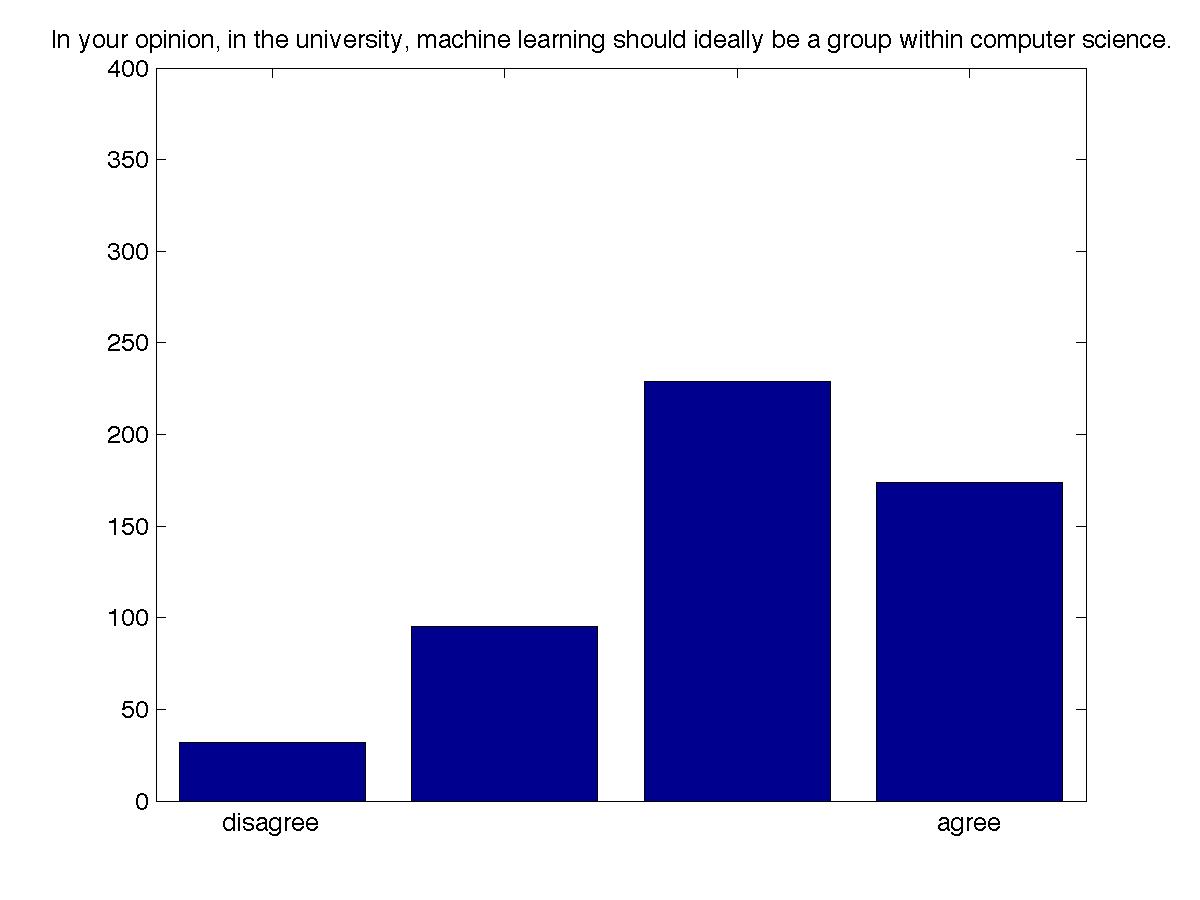 |
|
| Question 24 |
|
| In your opinion, in the university, machine learning should ideally be a group within neuroscience. |
| Frequency table |
|
Levels
|
Absolute frequency |
Relative frequency |
Adjusted relative frequency |
|
1 (Disagree)
|
310 |
39.54% |
58.71% |
|
2
|
166 |
21.17% |
31.44% |
|
3
|
47 |
5.99% |
8.9% |
|
4 (Agree)
|
5 |
0.64% |
0.95% |
| Not answered: |
256 |
32.65% |
- |
| Sum: |
784 |
100% |
100% |
| Total answered: 528 |
| Plot |
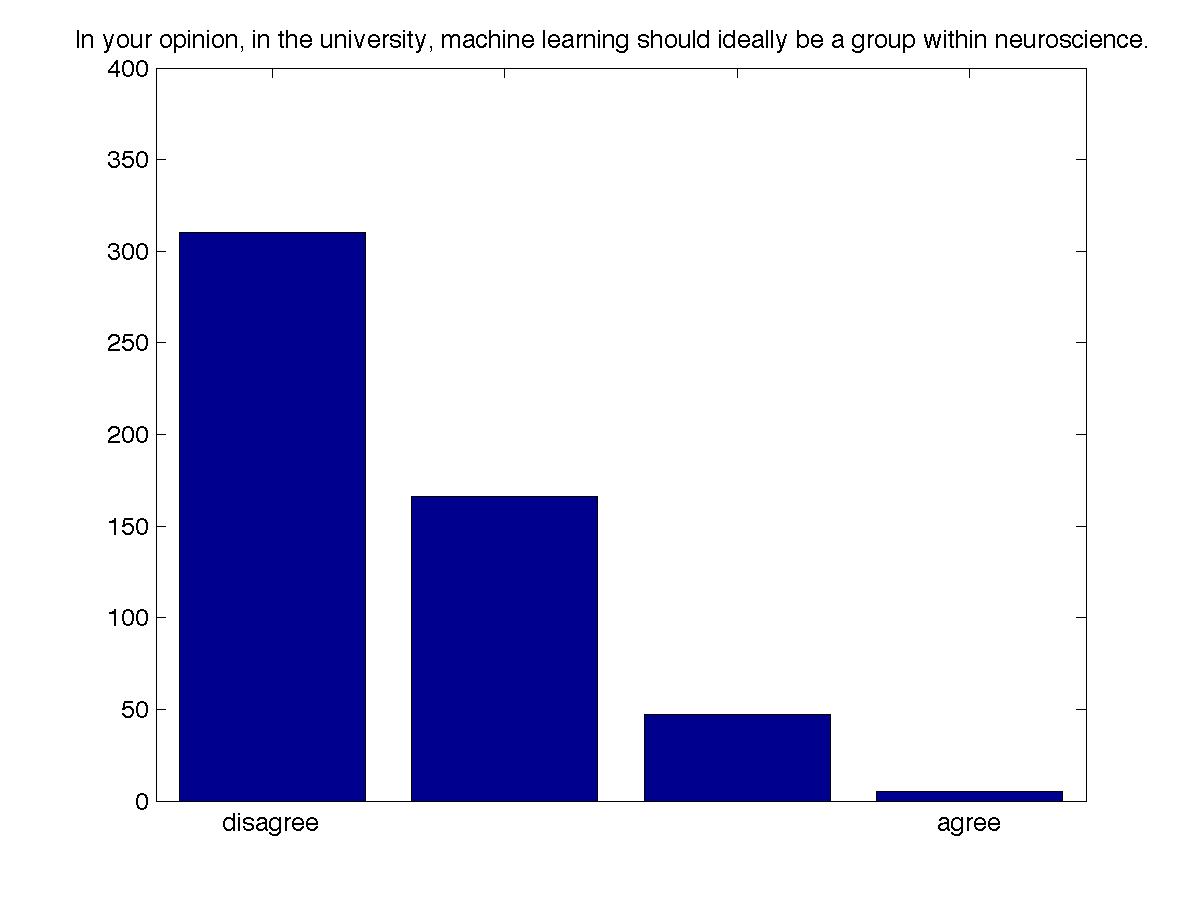 |
|
| Question 25 |
|
| In your opinion, in the university, machine learning should ideally be a group within engineering. |
| Frequency table |
|
Levels
|
Absolute frequency |
Relative frequency |
Adjusted relative frequency |
|
1 (Disagree)
|
154 |
19.64% |
29% |
|
2
|
203 |
25.89% |
38.23% |
|
3
|
128 |
16.33% |
24.11% |
|
4 (Agree)
|
46 |
5.87% |
8.66% |
| Not answered: |
253 |
32.27% |
- |
| Sum: |
784 |
100% |
100% |
| Total answered: 531 |
| Plot |
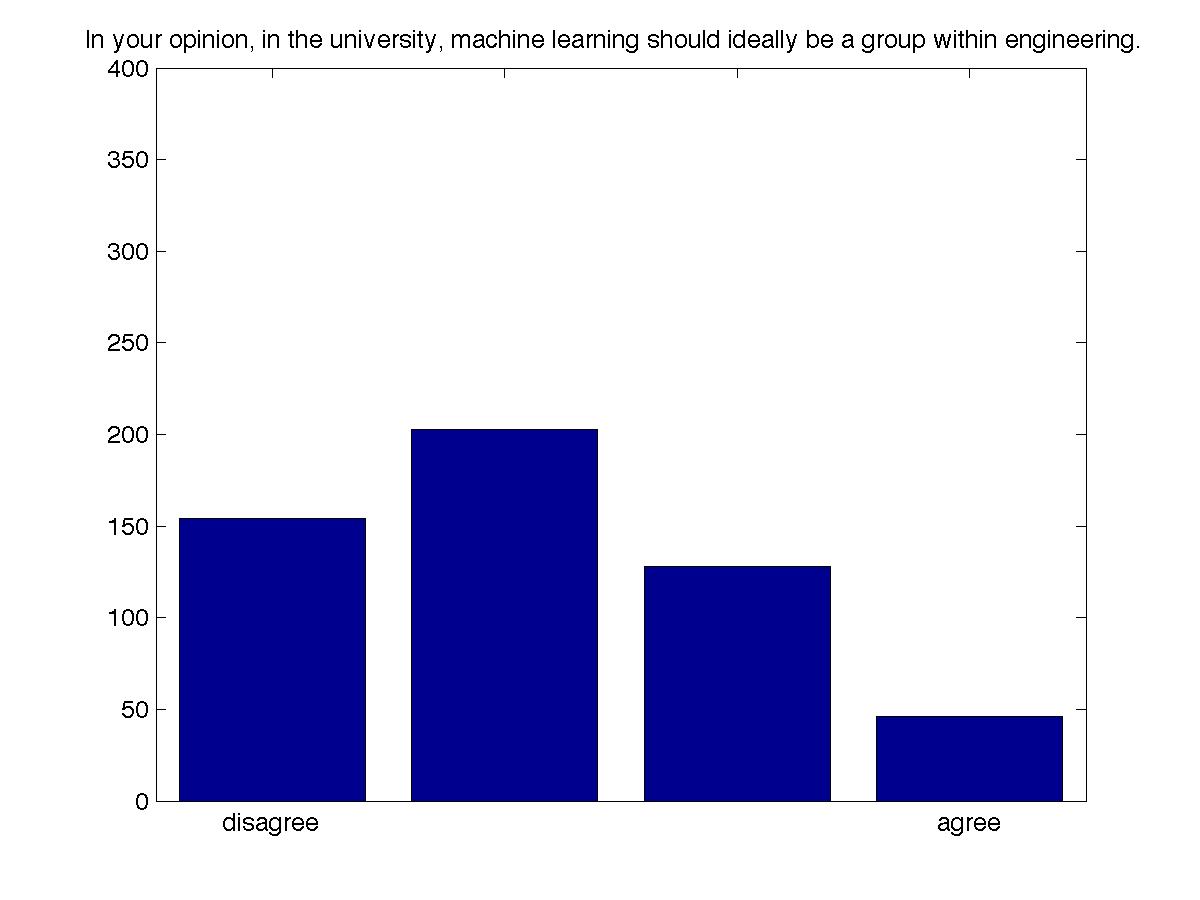 |
|
| Question 26 |
|
| In your opinion, in the university, machine learning should ideally be a group within statistics. |
| Frequency table |
|
Levels
|
Absolute frequency |
Relative frequency |
Adjusted relative frequency |
|
1 (Disagree)
|
82 |
10.46% |
15.41% |
|
2
|
194 |
24.74% |
36.47% |
|
3
|
201 |
25.64% |
37.78% |
|
4 (Agree)
|
55 |
7.02% |
10.34% |
| Not answered: |
252 |
32.14% |
- |
| Sum: |
784 |
100% |
100% |
| Total answered: 532 |
| Plot |
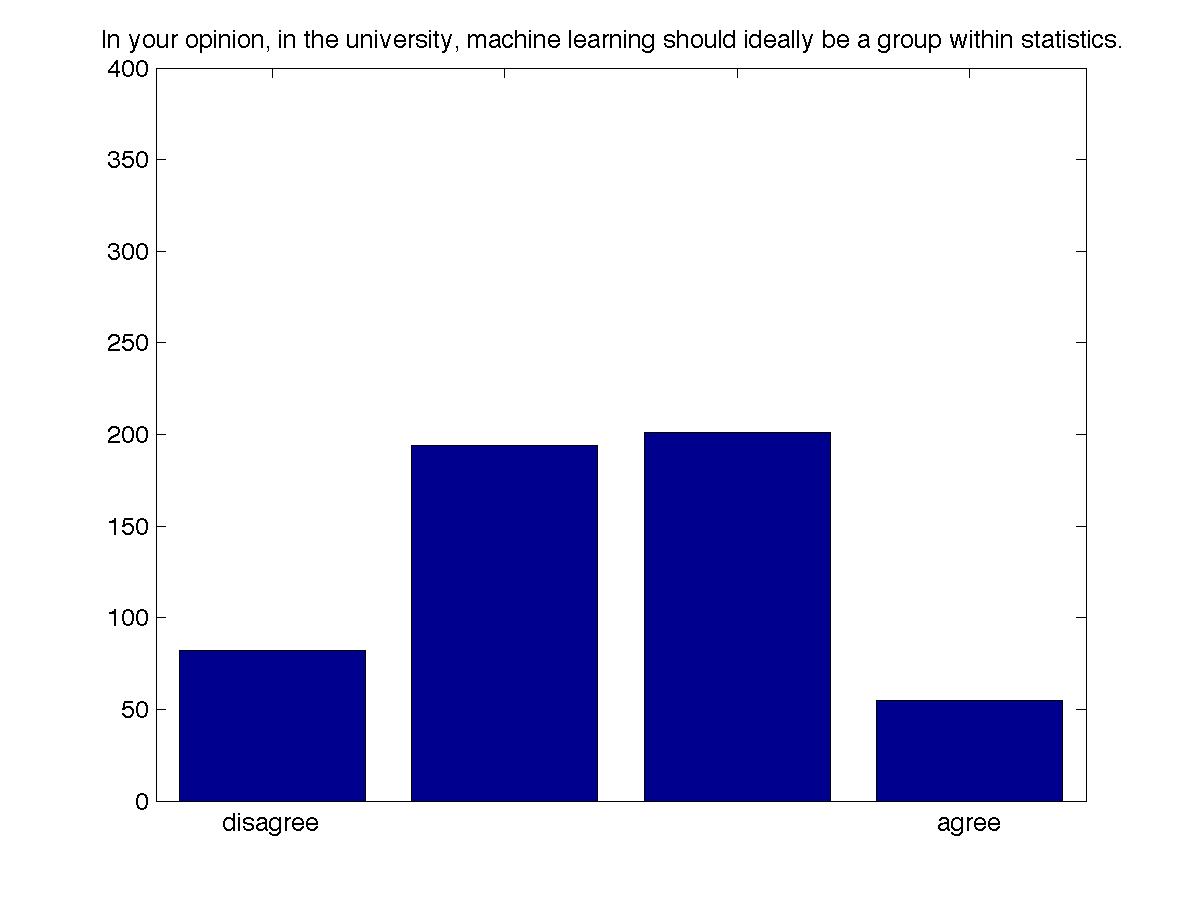 |
|
| Question 27 |
|
| In your opinion, in the university, machine learning should ideally be a group within psychology. |
| Frequency table |
|
Levels
|
Absolute frequency |
Relative frequency |
Adjusted relative frequency |
|
1 (Disagree)
|
381 |
48.6% |
71.75% |
|
2
|
131 |
16.71% |
24.67% |
|
3
|
16 |
2.04% |
3.01% |
|
4 (Agree)
|
3 |
0.38% |
0.56% |
| Not answered: |
253 |
32.27% |
- |
| Sum: |
784 |
100% |
100% |
| Total answered: 531 |
| Plot |
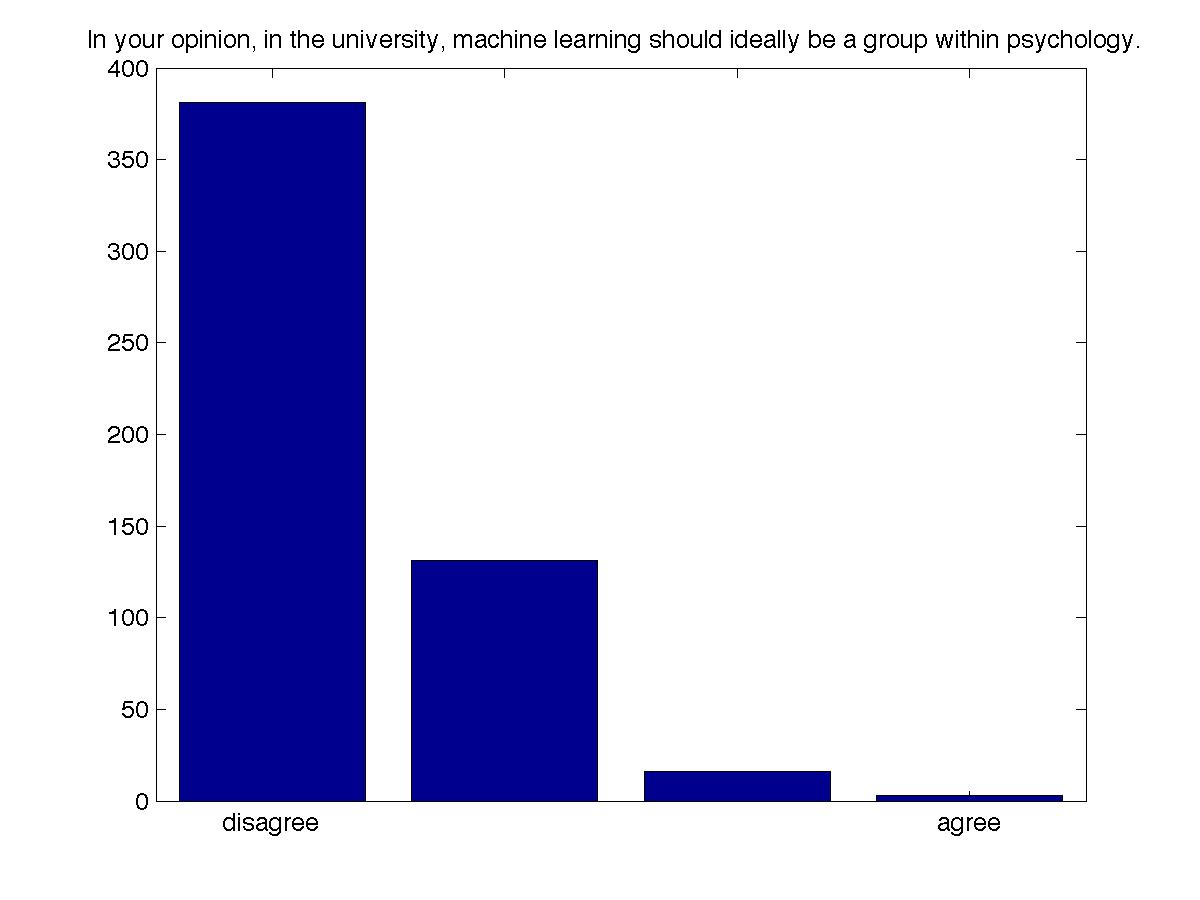 |
|
| Question 28 |
|
| In your opinion, in the university, machine learning should ideally be a spread across multiple departments. |
| Frequency table |
|
Levels
|
Absolute frequency |
Relative frequency |
Adjusted relative frequency |
|
1 (Disagree)
|
94 |
11.99% |
17.77% |
|
2
|
123 |
15.69% |
23.25% |
|
3
|
171 |
21.81% |
32.33% |
|
4 (Agree)
|
141 |
17.98% |
26.65% |
| Not answered: |
255 |
32.53% |
- |
| Sum: |
784 |
100% |
100% |
| Total answered: 529 |
| Plot |
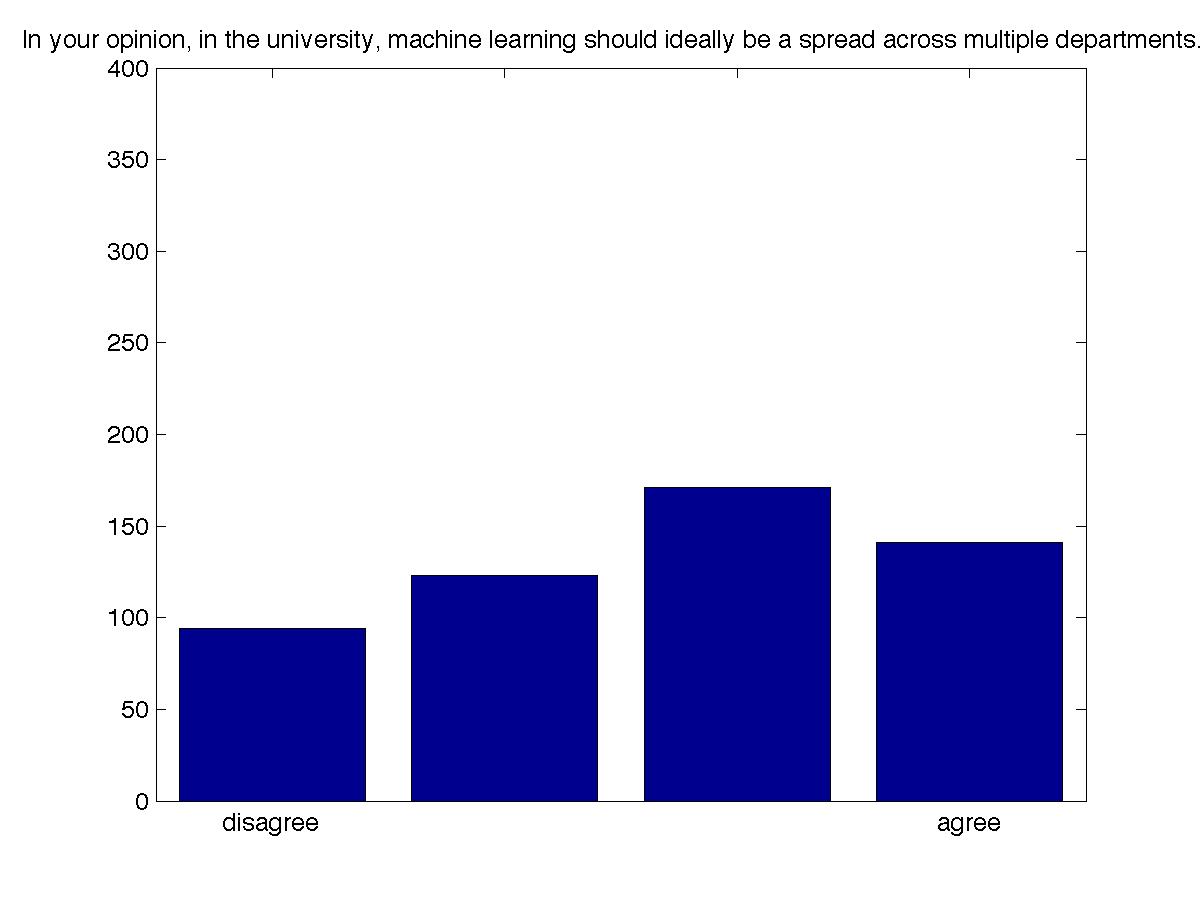 |
|
| Question 29 |
|
| In your opinion, in the university, machine learning should ideally be an interdisciplinary centre. |
| Frequency table |
|
Levels
|
Absolute frequency |
Relative frequency |
Adjusted relative frequency |
|
1 (Disagree)
|
24 |
3.06% |
4.52% |
|
2
|
74 |
9.44% |
13.94% |
|
3
|
193 |
24.62% |
36.35% |
|
4 (Agree)
|
240 |
30.61% |
45.2% |
| Not answered: |
253 |
32.27% |
- |
| Sum: |
784 |
100% |
100% |
| Total answered: 531 |
| Plot |
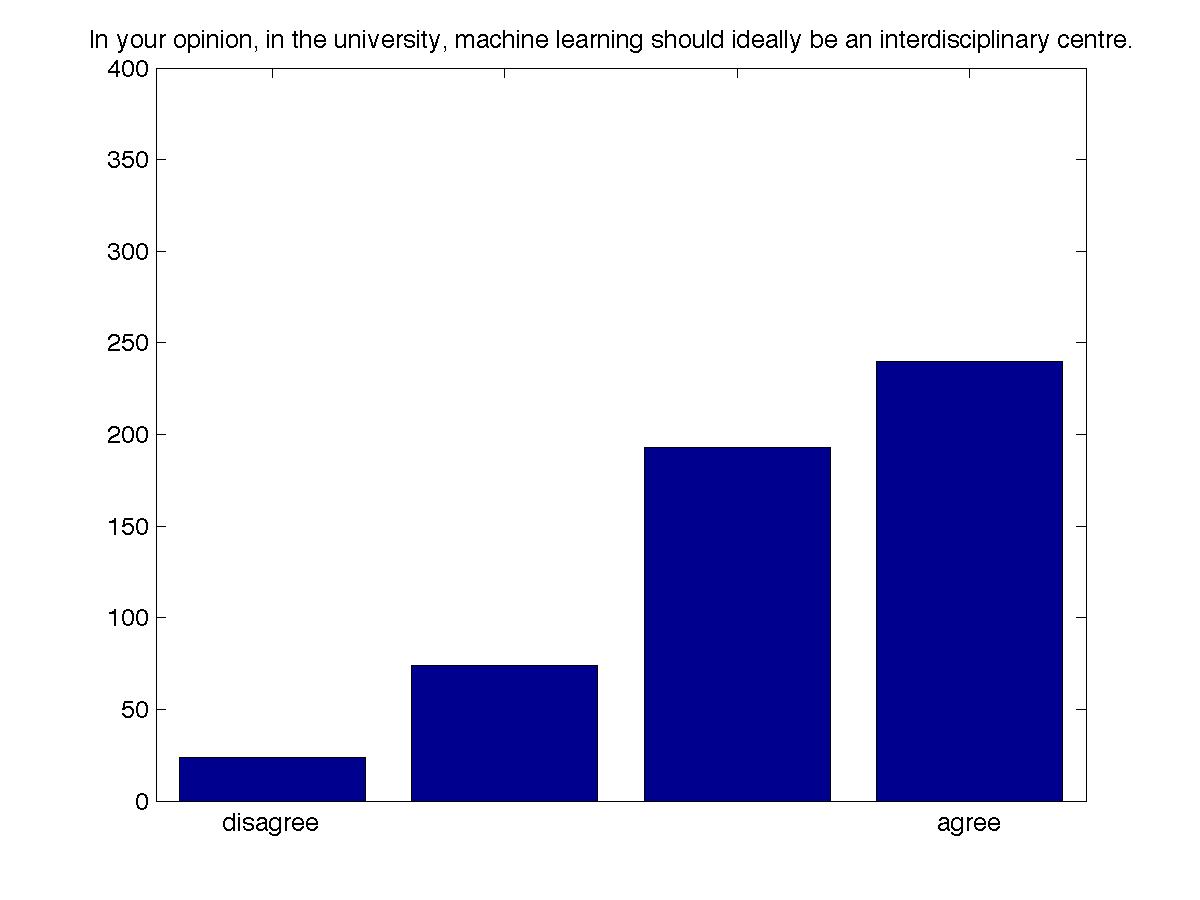 |
|
| Question 30 |
|
| In your opinion, in the university, machine learning should ideally be its own department. |
| Frequency table |
|
Levels
|
Absolute frequency |
Relative frequency |
Adjusted relative frequency |
|
1 (Disagree)
|
136 |
17.35% |
25.66% |
|
2
|
147 |
18.75% |
27.74% |
|
3
|
130 |
16.58% |
24.53% |
|
4 (Agree)
|
117 |
14.92% |
22.08% |
| Not answered: |
254 |
32.4% |
- |
| Sum: |
784 |
100% |
100% |
| Total answered: 530 |
| Plot |
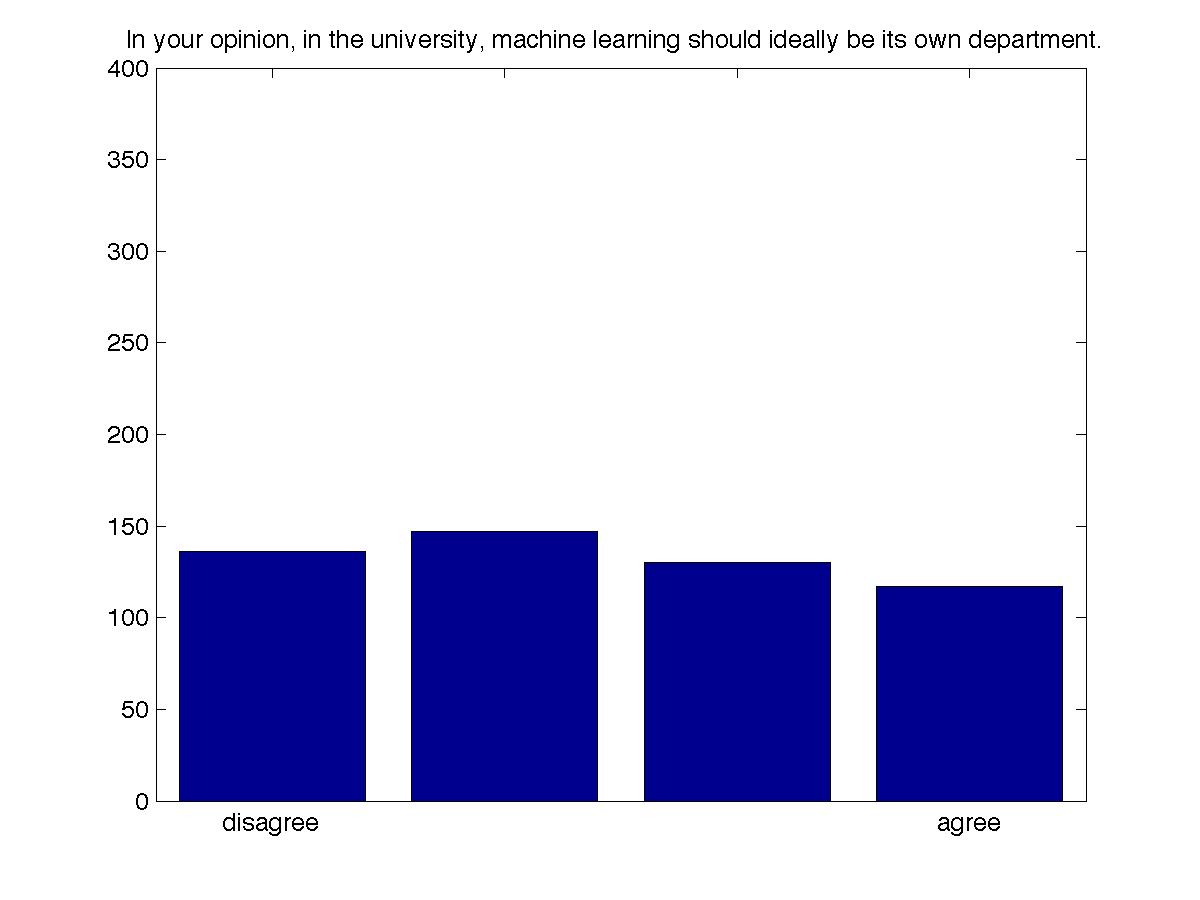 |
|
| Question 31 |
|
| In your opinion, in the university, machine learning should be taught at the graduate level. |
| Frequency table |
|
Levels
|
Absolute frequency |
Relative frequency |
Adjusted relative frequency |
|
1 (Disagree)
|
16 |
2.04% |
3.03% |
|
2
|
36 |
4.59% |
6.82% |
|
3
|
139 |
17.73% |
26.33% |
|
4 (Agree)
|
337 |
42.98% |
63.83% |
| Not answered: |
256 |
32.65% |
- |
| Sum: |
784 |
100% |
100% |
| Total answered: 528 |
| Plot |
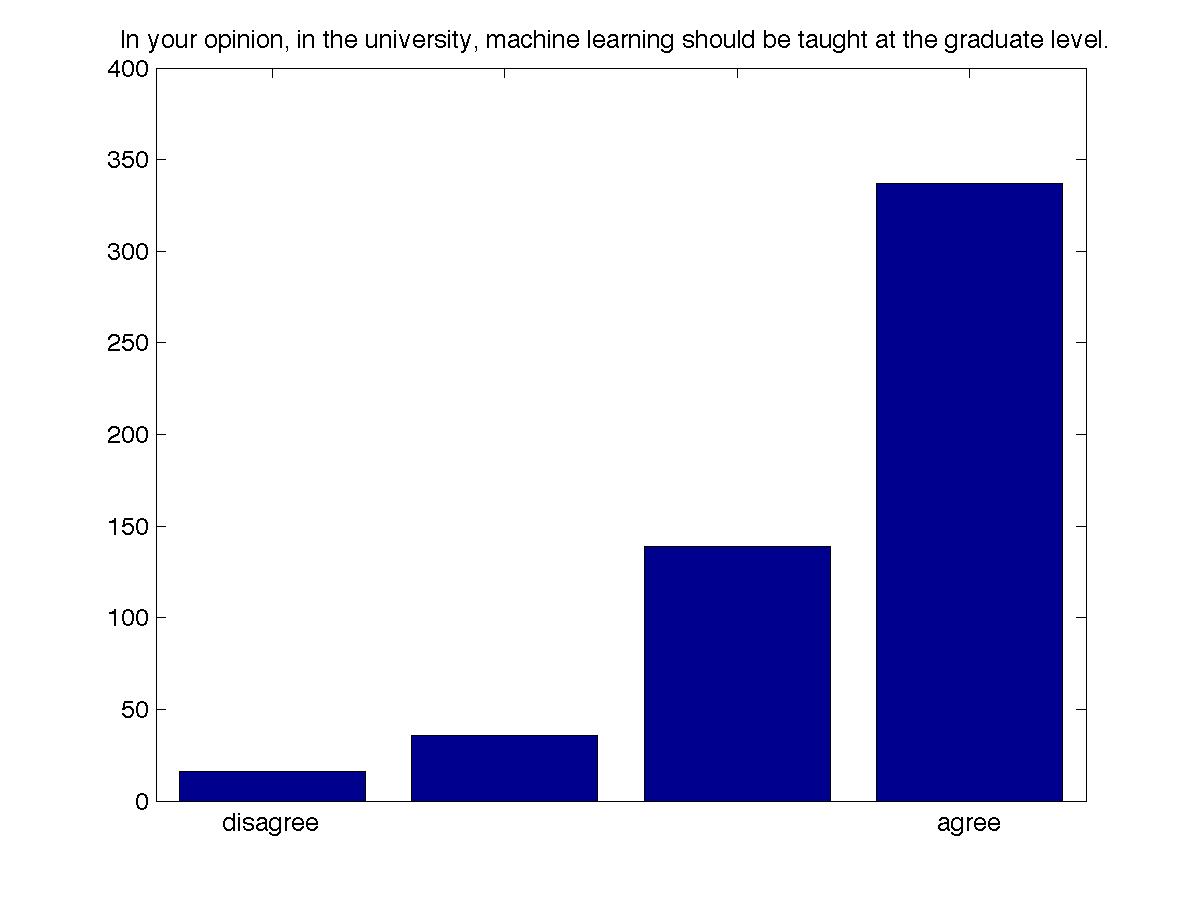 |
|
| Question 32 |
|
| In your opinion, in the university, machine learning should be taught as a specialist track in a related undergraduate programme. |
| Frequency table |
|
Levels
|
Absolute frequency |
Relative frequency |
Adjusted relative frequency |
|
1 (Disagree)
|
23 |
2.93% |
4.34% |
|
2
|
90 |
11.48% |
16.98% |
|
3
|
205 |
26.15% |
38.68% |
|
4 (Agree)
|
212 |
27.04% |
40% |
| Not answered: |
254 |
32.4% |
- |
| Sum: |
784 |
100% |
100% |
| Total answered: 530 |
| Plot |
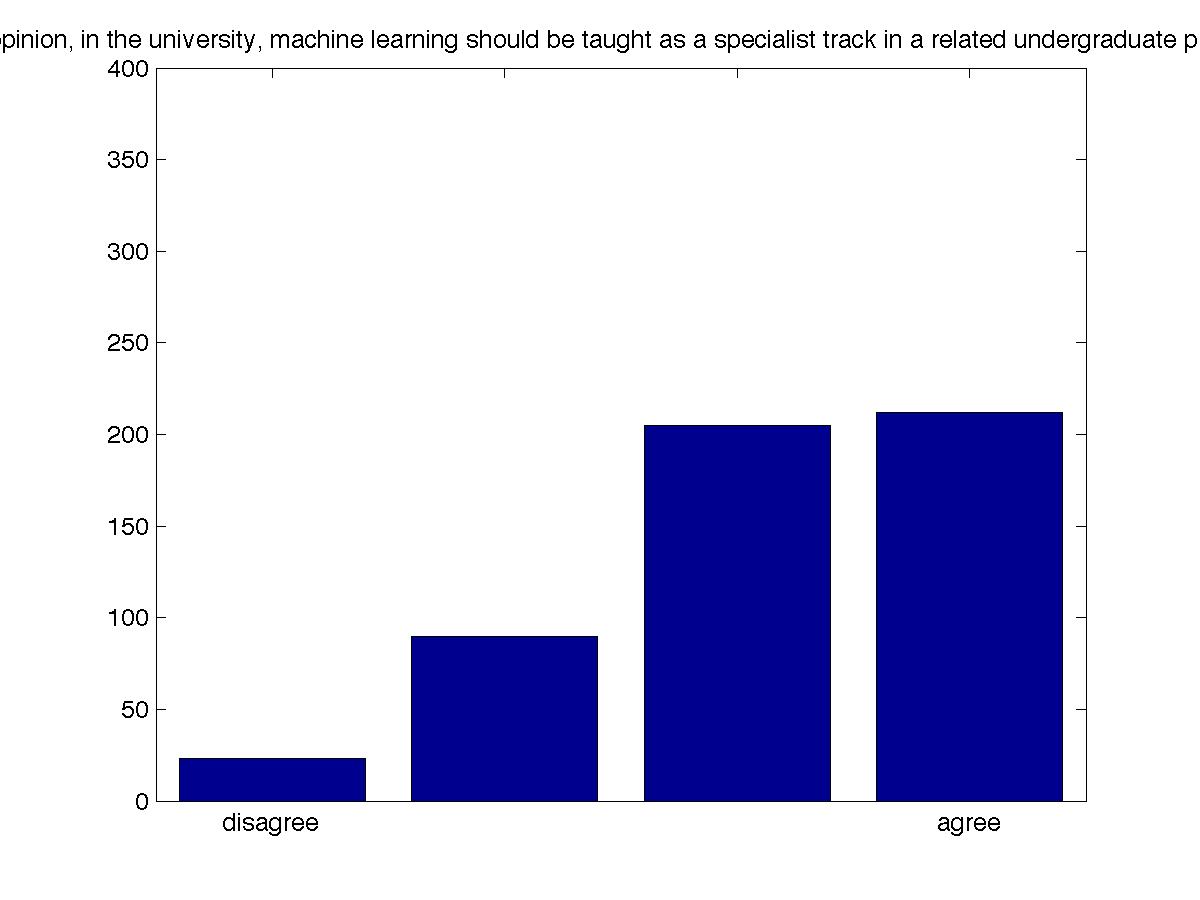 |
|
| Question 33 |
|
| In your opinion, in the university, machine learning should be taught in a dedicated undergraduate programme. |
| Frequency table |
|
Levels
|
Absolute frequency |
Relative frequency |
Adjusted relative frequency |
|
1 (Disagree)
|
112 |
14.29% |
21.29% |
|
2
|
207 |
26.4% |
39.35% |
|
3
|
123 |
15.69% |
23.38% |
|
4 (Agree)
|
84 |
10.71% |
15.97% |
| Not answered: |
258 |
32.91% |
- |
| Sum: |
784 |
100% |
100% |
| Total answered: 526 |
| Plot |
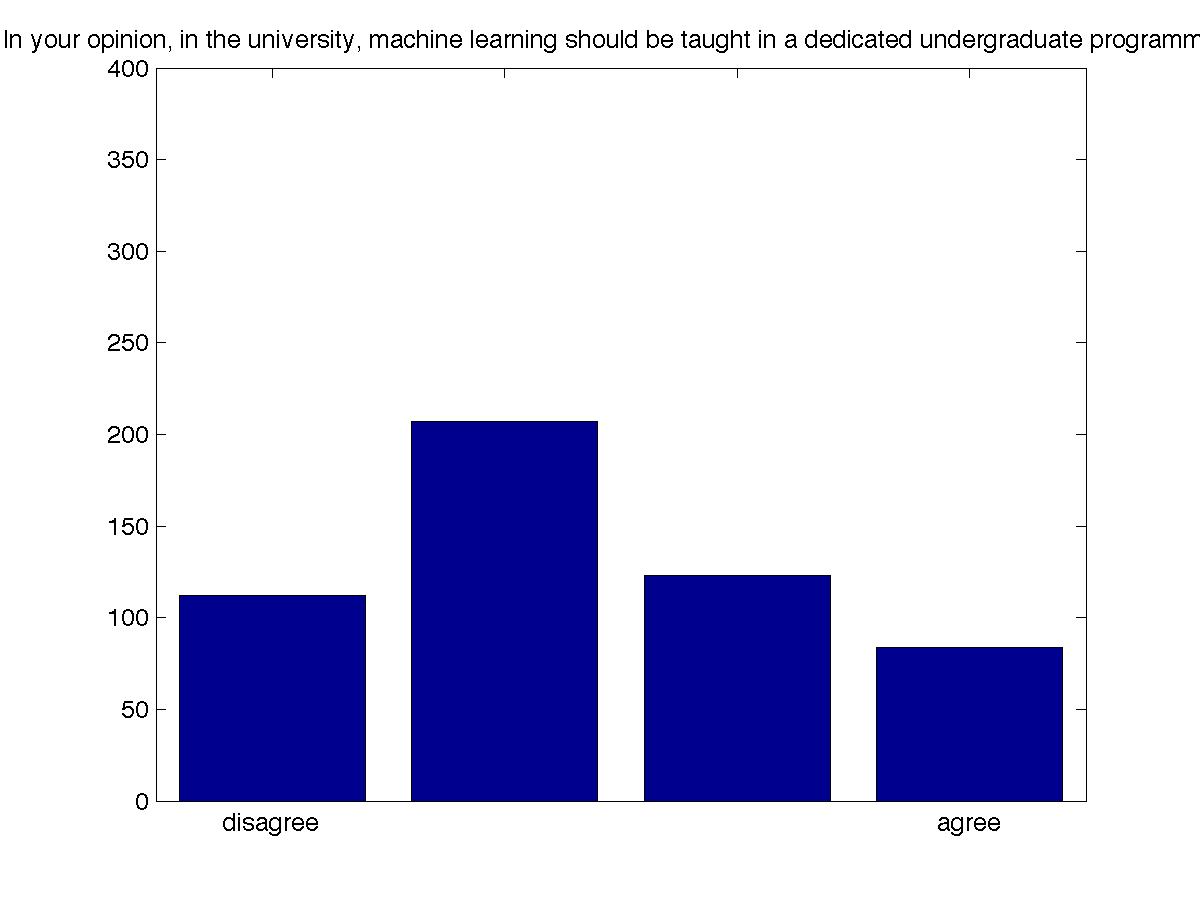 |
|
| Question 34 |
|
| In your opinion, in which departments should machine learning be taught? |
| Frequency table |
|
Choices
|
Absolute frequency |
Relative frequency |
Adjusted relative frequency |
|
Biology
|
95 |
3.48% |
17.79% |
|
Cognitive science
|
176 |
6.46% |
32.96% |
|
Computer science
|
510 |
18.71% |
95.51% |
|
Economics
|
100 |
3.67% |
18.73% |
|
Electrical engineering
|
166 |
6.09% |
31.09% |
|
Engineering sciences
|
200 |
7.34% |
37.45% |
|
Machine Learning
|
379 |
13.9% |
70.97% |
|
Mathematics
|
195 |
7.15% |
36.52% |
|
Neuroscience
|
151 |
5.54% |
28.28% |
|
Operations research
|
144 |
5.28% |
26.97% |
|
Physics
|
68 |
2.49% |
12.73% |
|
Psychology
|
71 |
2.6% |
13.3% |
|
Social science
|
63 |
2.31% |
11.8% |
|
Statistics
|
393 |
14.42% |
73.6% |
|
Other:
|
15 |
0.55% |
2.81% |
| Sum: |
2726 |
100% |
100% |
| Total answered: 534 |
| Plot |
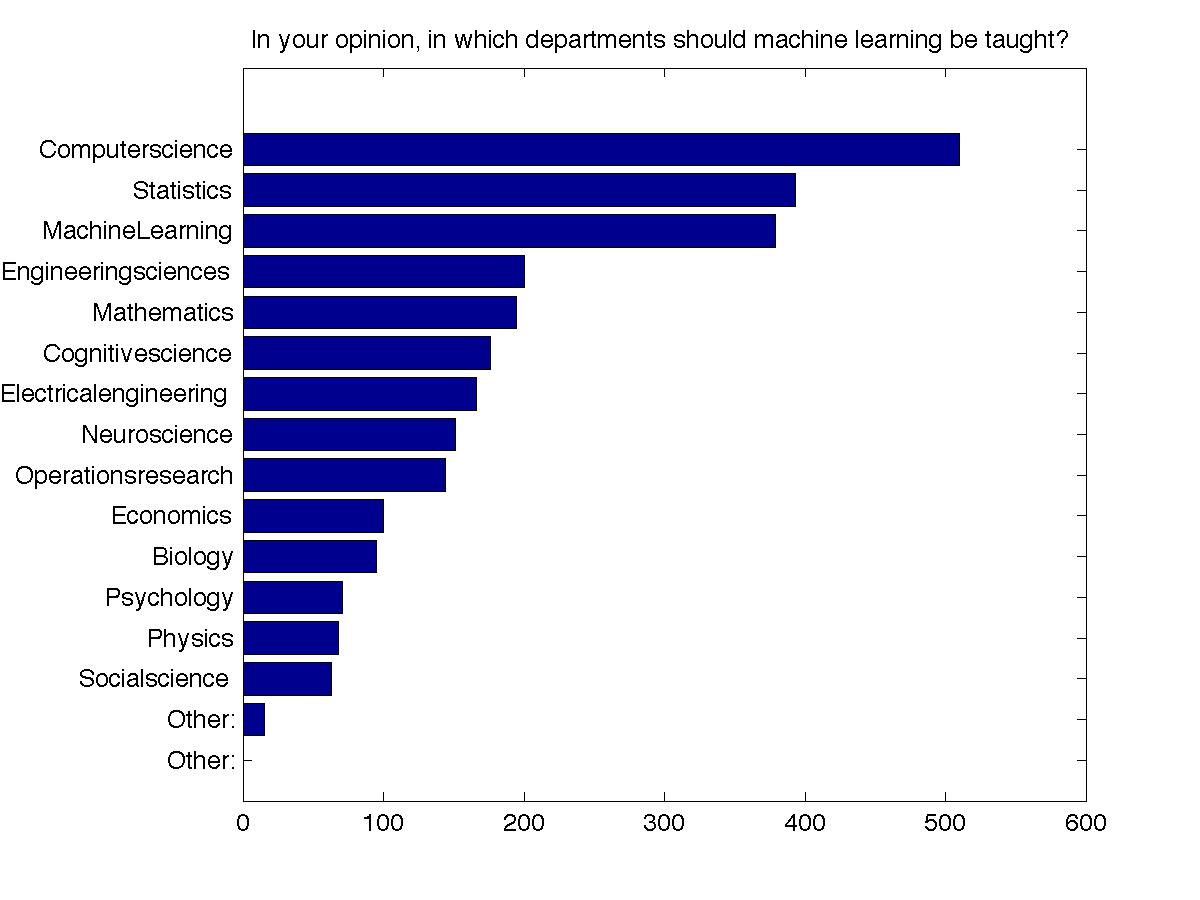 |
|
| Question 35 |
|
| Any further comments regarding the place of machine learning within the university? |
|
|
| Text input |
|
I wasn't quite sure how to answer these questions. ML should be *taken* by students from various departments, but it should be taught by experts in ML who come from (eg) statistics.
|
|
I think this will be the last field to have humans replaced by computers, so having a larger proportion of students go into it since early in their academic career is probably a good idea.
|
|
When deciding where to do machine learning, local culture and expertise matters more than the name of department.
|
|
I don't believe that ML should be a *track* but do believe strongly that there should be undergraduate course(s) in machine learning.
|
|
in my opinion, the core of machine learning is mostly closely related to statistics and computer science, and requiring considerable other domain knowledge from both.
|
|
Machine Learning should be integrated in the undergraduate curriculum in connection with the statistics education.
|
I've studied maths as an undergraduate student, not so much after that.
I recently found out machine learning started giving me stronger and deeper insights and understanding on different fields of mathematics (mainly in linear algebra, numerical analysis, statistics) which I had found to be pretty disconnected from any reality.
In fact, I think machine learning could be a very nice way to get into various theoretical of applied fields, in undergraduate programmes.
|
|
It shares foundations with CS, applied math, OR, and statistics, so it should be taught in one of those departments (at least at the graduate level).
|
|
Doing machine learning properly requires background in a number of different topics, so however and wherever it is taught, the students should be expected to have appropriate background in algorithms, complexity, programming, basic statistics, probability, linear algebra, optimization, some real analysis, and so on. Many courses just don't list many of these things as requirements but then end up relying on all these topics anyway, which leads to trouble for many students.
|
|
introducing machine learning too early (undergrad) may lead to more confusion rather than make the student appreciate the multidisciplinary nature of this field
|
|
In my opinion, machine learning is a subfield of CS like any other -- like AI, Theory, etc., and should be treated as such.
|
|
There is no universally "ideal" place of ML in universities. It really depends on the university.
|
|
It should be in the same department where AI is.
|
|
I don't think there needs to be a specialist track for undergrads. One can always piece together statistics, optimization, and computer science courses to form a concentration or minor in machine learning.
|
Ideally CS, Stat, and (to some extent) EE should collaborate on teaching a broad, deep set of courses at the graduate level,
and perhaps just one course at the undergraduate level
|
|
Ideally, introductory courses/seminars could also be provided in all the unchecked, aforementioned departments. This is to indicate to other departments the possibility of using Machine Learning as a tool.
|
|
I have no experience with any department of "Operations research" so can't tell about its relation to machine learning (although it sounds like a department with many AI applications).
|
|
Spread across separate departments is okay. There should just be an unprecedented amount of collaboration between the groups. Some schools do this pretty well (UWisc - Madison for one). Some schools fail spectacularly (UWash for one).
|
34: Haha, I'd not enroll in a machine learning department which does not teach machine learning!
|
|
These questions are confusing because there are many ways to implement the ideas.
|
|
Computer science should be split into "IT", "software development" and "computational science". Then, ML clearly belongs as a part of computational science. If those three fields must be all lumped together under the banner of "computer science", then ML is no longer such a good fit, and probably belongs in the math department.
|
|
large panel of applications (so not linked to a specific domain) ; its mathematical background should be known by every graduate student in science (where mathematics are a usual tool)
|
|
Many of the other departments could benefit from some machine learning, but primary practioners should probably come from stats, CS or engineering.
|
|
(I am not a university person, I don't hold strong opinions, except that the strong disciplinary boundaries as they have emerged in academia are a problem for many fields, not only machine learning.
|
|
Soft Computing includes Machine Learning. Soft Computing is a generic term.
|
I think the current diversity where machine learning is positioned in different ways to different departments in different universities is ok. I think the interests of the group leaders affect the ideal position greatly...
I am not sure if students should focus on machine learning at the undergraduate level... I think it is a useful area for students of many backgrounds to have some knowledge of.
A machine learning course focused on exploratory data analysis, particularly graphical would have very general appeal and could probably replace a statistics course and would be of value to a student in almost any dicipline. On the other hand courses in Bayesian theory are most suited to students in quantitive diciplines as well as areas such as pschology and economics.
|
|
I believe Machine Learning should be taught in collaboration between computer science and mathematics, with access to the course/modules by other departments.
|
Q 31 is a bit unclear -- does it mean *only* at grad level?
I don't think it really makes sense to have an u/grad degree in ML. It is fine as a specialization
in e.g. CS.
Having dealt with interdisciplinaryity at our univeristy, I think it is fine to teach ML in CS, but there is a need to open this up to students from other depts.
|
|
| Question 36 |
|
| What brought you into machine learning? (You may select more than one) |
| Frequency table |
|
Choices
|
Absolute frequency |
Relative frequency |
Adjusted relative frequency |
|
I want to use machine learning techniques to analyse data.
|
328 |
27.02% |
63.69% |
|
I want to understand how the brain works.
|
117 |
9.64% |
22.72% |
|
I want to understand the fundamental principles of learning and intelligence.
|
280 |
23.06% |
54.37% |
|
I want to understand existing machine learning techniques and develop new ones.
|
279 |
22.98% |
54.17% |
|
I want to build intelligent computers or robots.
|
210 |
17.3% |
40.78% |
| Sum: |
1214 |
100% |
100% |
| Total answered: 515 |
|
| Text input |
|
To be more specific, I am more interested in *replicating* what the brain can do, whether by its algorithms or novel ones.
|
|
In addition, I want to get a good job and make money and ML is a hot pre-requisite :)
|
There was a post there
|
|
I thought machine learning was well suited to biological data analysis, to extract meaningful signals from voluminous noisy data.
|
|
Actually, I was working on classification of musical signals, not being really aware that machine learning was a "field on its own". I found a related PhD by chance and ent for it.
|
|
ill fortune
|
|
It is the dual case of logic-based AI
|
|
I didn't intentionally go into M.L.; I work on some stuff (cluster analysis, model selection etc.) that at some point people started to assign to M.L., so it basically sucked me in.
|
|
After taking a couple of classes, it became more and more fascinating to understand the relationships between successful methods in engineering, for example how the Kalman filter relates to an HMM, how reinforcement learning relates to MDP which relates back again to state-space control.
|
|
Accident
|
|
It was just a tool for a certain application I was interested in (computer vision). I'd already been using machine learning for a long time before becoming interested in studying it.
|
|
Randomness ;)
|
|
I want to be able to make accurate predictions.
|
|
I like math.
|
|
Sheer luck
|
|
my research (in statistics and computer science) often involves problems and methods that intersect the area of machine learning research.
|
|
I am a researcher working the area of computational linguistics, were in order to train our models we require lost of data which trained using different supervised/semi-supervised approaches.
|
|
I want to use machine learning for scientific discovery. Modern high throughput methods make manual discovery of new knowledge very hard.
|
|
From what I have seen, unfortunately machine learning is now far remote from its neuroscience origins (see e.g. NIPS).
|
|
1,2,4,5 ==> 3
|
but we should be modest (e.g. the word "intelligent" is too strong
another connected field is assisted-computer instruction
|
Decision making from uncertain data very rapidly becomes a core asset in about any of the natural
sciences and serious applications (e.g., medical). ML does not right now live up to this new role,
focussing on overly fancy models instead, and that's why other fields (signal processing, ...) do
the job. I'd want to help changing that.
|
|
strong links between ML and core concepts in physics (invariant search)
|
|
I want to understand life. Learning was the key element that throughout evolution shaped life into its diverse forms today.
|
|
I participated in a competition as part of a lab course and that got me hooked.
|
|
I want to know one thing which is broadly applicable. That thing is machine learning.
|
|
Powerful statistic tool
|
|
I want to build cognitive tutors.
|
|
To me it is fascinating how complex the brain is, yet we can develop simple and elegant mathematical equations that help us outperform the human brain in some, trivial yet surprisingly powerful, tasks.
|
|
everything is information
|
|
I want to understand myself :)
|
|
I want to solve cool (but very difficult) problems.
|
|
More or less by accident. (My advisor was starting a project in machine learning when I was starting my thesis.)
|
|
I want to push robots and autonomous sytems to their limits where first principle models are not available anymore or are too complex to derive. I want to use methods from machine learning to close this gap.
|
|
| Question 37 |
|
| In your opinion, what are the goals of machine learning? (You may select more than one) |
| Frequency table |
|
Choices
|
Absolute frequency |
Relative frequency |
Adjusted relative frequency |
|
To understand the fundamental principles of learning and intelligence.
|
311 |
19.82% |
59.81% |
|
To analyze and extract useful information from data.
|
420 |
26.77% |
80.77% |
|
To understand how the brain works.
|
108 |
6.88% |
20.77% |
|
To build smarter computers or robots.
|
296 |
18.87% |
56.92% |
|
To develop algorithms for making accurate predictions based on data.
|
434 |
27.66% |
83.46% |
| Sum: |
1569 |
100% |
100% |
| Total answered: 520 |
|
| Text input |
|
While some people argue that learning the fundamentals of learning is the goal (and maybe it should be, given the name of the field), most of the community seems to be working on the latter two goals
|
|
To understand people and society.
|
|
Maybe give some insights on older / more general problems such as data representation.
|
|
To provide an alternative methodology for building successful software systems.
|
|
currently however, the goals seem to be less dramatic; also a fundamental goal of ML is to actually help humans make better decisions---an aspect that is often underplayed.
|
|
These are all good goals for machine learning, but for me the first one is the most important.
|
|
To create computer-implementable algorithmically-representable descriptions which when applied for a task are able to improve their performance on it with experience.
|
|
There are a lot of reasons, but one that's not listed above would be to understand how to solve concrete problems in the world, either in engineering or other fields.
|
|
"To analyze and extract useful information from data" is hopefully something the stats. department does, alltough it seems that ML people are often/sometimes better at it with the more open minded viewpoint.
|
|
To me, a big problem is that of building a robot that is capable of continual learning in the same constructive sense as a baby. Many early attempts werevague and flaky. Many modern attempts are rigorous but largely miss the point. Ideally, ML should steer clear of both extremes and strive to be a scientific theory that is diverse, rich and open.
|
|
I think the other options are goals that people in machine learning can have, but generally when they also have a cross interest in another area as well - like neuroscience.
|
|
ml may be defined as a spacial set of problems in statistics and computer science. it often does not have any concrete goals; it is methodology for methodology's sake.
|
|
- To mathematically and computationally model real-world processes and data.
|
|
The last two (fundamental principles of learning and intelligence and how the brain works) needs to be done by (or in very, very close connexion) with neuroscientists, biologists, neurosurgeons, rather than algorithmic prone geeks ;) Otherwise, risk of coming up with a gazillion "ground-breaking" but not biology-backed (or on half-understood biology) schemes of "how the brain works". We (geeks) are experts at algorithms, coding, math, but not on biology -- and machine learning has evolved in our playground, getting further than its Neuroscience roots.
|
|
I've picked only direct goals above.
|
|
in my opinion, it's realy philosophic
|
|
I don't believe that computer are smart at all. Machine learning is just a complex mathematical model that can simplify some problem
|
ML is not science, but (very difficult) engineering. Why should I understand how the brain works
without doing experiments on creatures with a brain? For every 1 MLer seriously involved in helping neuroscientists analyze their data, there are 20 who "understand how the brain works". Not useful.
|
|
To make rational decisions, where humans are bad at doing them (e.g. driving)
|
|
Basically all the "smart planet" stuff IBM keeps talking about without all the business talk. So maybe Operations Research for a better planet.
|
-To provide other disciplines with the computational tools and insight for analyzing large amounts of data, or complex phenomena within that data.
|
|
to help human in the tasks it performs better than human
|
|
Machine learning will, in part supercede statistics as it matures.
|
|
Even though I believe cognitive research and ML research differ (birds vs planes...) both are definitely interesting and can benefit from each other.
|
|
To understand human being more
|
|
I often summarize my interests in ML as "finding structure in data". This relates more to unsupervised learning than say supervised or RL.
|
|
| Question 38 |
|
| Do you have further comments regarding any part of this survey? |
|
|
| Text input |
|
You should let us know how many questions there are at the beginning...
|
|
are ywteh@ucl.ac.uk gonna be the head of new ml department?
|
|
I'm uncomfortable with your question on the foundations. The foundations are not really related to the various keywords describing current topics (e.g., semi-supervised learning). The foundations are in statistics, information theory, optimization, and algorithms.
|
|
good survey.
|
|
I feel that machine learning is still a collection of results and techniques, and is not yet a 'natural' subject, in the sense that, say, maths, physics, or psychology are natural subjects. There may eventually be a subject called 'Principles of Intelligence and Learning', but it doesn't quite exist yet. (But hey, the fact that the subject did not really exist didn't stop psychologists founding psychology departments in the early 20th century !
|
|
As written before in a slightly different way, I'm not much concerned about the definition and "academic location" of knowledge areas such as M.L. If something is interesting to me and I have something to offer, I do it, and I don't mind what the broader area is called and with what departments it's connected.
|
|
Finally! Great job.
|
|
Now you can go ahead and apply learning algorithms over machine learners.
|
Great work.
Do make the raw results available!
|
|
In my view, the "machine learning = statistical data analysis" equation is killing the field, just as "control theory = stability analysis of linear and slightly nonlinear systems" has killed that field.
|
|
Some questions seemed to be repeated. For example, the question on whether ML should be made multi-disciplinary was repeated.
|
|
This is a very interesting effort.
|
|
Thanks for organizing it, looking forward to the picture of the field that will emerge from its results.
|
|
No.
|
|
good luck when the time to analyse our responses will come !
|
|
Thank you for doing this. This is a great survey.
|
it is not necessary to put ML into the boxes
It is a multidisciplinary topic and shoud be developped and teached in many domains with different (adapted) points of view
|
|
Your survey seems to target authorities rather than students (I judge this based on questions like "Which department should ML belong to?"). I would appreciate if you also conduct a survey for students on problems of studying machine learning. Once those problems are identified and solutions are realized I hope our study process will be easier.
|
|
Soft Computing is an emerging computing paradigm or umbrella which includes Fuzzy Logic, Neural Systems and Machine Learning, Probabilistic Reasoning and Evolutionary Algorithms, and chaos Theory.
|
|
I was surprised to see that when linking the fields that might relate to machine learning, statistics was included, yet sometimes mathematics was not.
|
|
instead of 4 radio buttons, put 5 of them
|
|
Thanks for conducting it! I hope you publish the results.
|
|
Thanks for the great survey.
|
I would have preferred 5 options in the disagree/agree spectrum (to allow fence sitting!)
In some qus I felt I wanted to explain more of the reasons (although I appreciate this makes the analysis more difficult).
|
|
|































